

Retail InnovationTechnology Hub















































ISSUE
April - June 2024
EDITOR AND FOUNDER
Scott Thompson
Tel: 07528 807353
Email: scott.thompson@retailtechinnovationhub.com
Website: www.retailtechinnovationhub.com
LinkedIn: www.linkedin.com/company/ retail-technology-innovation-hub
CONTRIBUTORS
Neil Ainger
Oliver Banks
Mike Cadden
Liz Morrell
Christine Russo
PRINTED BY
The Manson Group
8 Porters Wood
Valley Road Industrial Estate
St Albans
AL3 6PZ
UK
Tel: 0800 118 2871
Email: enquiries@mansongroup.co.uk
GRAPHIC DESIGN
Steve Kelly
Concept Graphics
Tel: 07734 264835
Email: steve@conceptstudio.co.uk
© 2024 Paxton Media Limited

Retail InnovationTechnology Hub Editor’s letter Innovation
Welcome to the sixth issue of Retail Technology Innovation Hub (RTIH) magazine.
This bumper edition focuses on the 2023 RTIH Innovation Awards, the second RTIH Retail Technology Innovation Report, and the RTIH Top 100 Retail Tech Influencers List.
On Wednesday, 29th November, we announced the winning submissions for the 2023 RTIH Innovation Awards, sponsored by PMC, FreedomPay, Worldpay, CADS, 3D Cloud by Marxent, Goodays, Vista Technology Support, and Retail Technology Show.
Our winners were revealed during an event which took place at the Barbican Centre in central London and included a drinks reception in the stunning Conservatory, followed by a Christmas themed three course meal, and awards presentation in the Garden Room.
Check out our review of the event, starting on page four.
The latest edition of the RTIH Top 100 Retail Technology Influencers List, sponsored by 3D Cloud by Marxent, makes its official debut within these pages. We’re bringing you the people who made a splash in 2023 and are set for a barnstorming 2024.
RTIH has scoured the retail technology world to find the most influential figures for this comprehensive list of people and trends that shape the industry and help drive it forward. Enjoy!
And last but certainly not least, I’m pleased to announce the launch of our second Retail Technology Innovations Report, also sponsored by 3D Cloud by Marxent, which provides 3D product visualisation software trusted by top furniture and DIY retailers.
This highlights the top 50 retail tech plays of the past 12 months as decided by myself and an independent advisory panel.
We were looking for groundbreaking technology deployments, launches, and pilots from across the omnichannel retail landscape, be they payments, supply chain, online, mobile, physical store etc related.
Innovation and technology play a critical role in the success of the retail sector, and it is great to celebrate this with our awards, influencers list, and top 50 report.
 Scott Thompson Editor & Founder, RTIH
Scott Thompson Editor & Founder, RTIH
scott.thompson@retailtechinnovationhub.com www.retailtechinnovationhub.com

Celebrating a year to remember
On Wednesday, 29th November, we announced the winning submissions for the 2023 RTIH Innovation Awards, sponsored by PMC, FreedomPay, Worldpay, CADS, 3D Cloud by Marxent, Goodays, Vista Technology Support, and Retail Technology Show.

2023 RTIH Innovation Awards
Our winners were revealed during an event which took place at the Barbican Centre in Central London and included a drinks reception in the stunning Conservatory, followed by a Christmas themed three course meal, and awards presentation in the Garden Room.
Scott Thompson, Founder and Editor, RTIH, says: “Since we launched the awards in 2019, they have gone from strength to strength and holding them at the Barbican Centre, a much loved, internationally acclaimed venue, is going to be a tough one to top.”

“Thanks to all those who entered the 2023 awards, many of whom were at our event. We received a record number of submissions this year and many fantastic examples of the continued resilience and dynamism of the retail space during hugely challenging times.”
“Congratulations to our 2023 winners and highly commended submissions.”
“To quote a member of our judging panel: “What a year, these awards are really going from strength to strength. There were many categories in there that were so difficult to call. Very worthy entries and winners.”


Most Innovative UK Retailer
Sponsored by 3D Cloud by Marxent
WINNER Polarn O. Pyret Most Innovative Retailer (Rest of World)
WINNER L’Occitane and Confer With HIGHLY COMMENDED: Studenac

WINNER Obsess and American Girl Digital Transformation Project of the Year
Sponsored by Vista Technology Support
Sponsored by Goodays
WINNER ZigZag



















2023 RTIH Innovation Awards
Omnichannel Retail Initiative of the Year
WINNER
NewStore and Footasylum
Technology Vendor of the Year (UK)
WINNER
OneStock
HIGHLY COMMENDED: Red Ant
Technology Vendor of the Year(Rest of World)
WINNER
Goodays
Startup of the Year
WINNER
Jellibeans
Technology Implementation of the Year (UK)
WINNER
HyperFinity and Costa Coffee
Technology implementation of the Year (Rest of World)
WINNER
Bojangles and Sparkfly
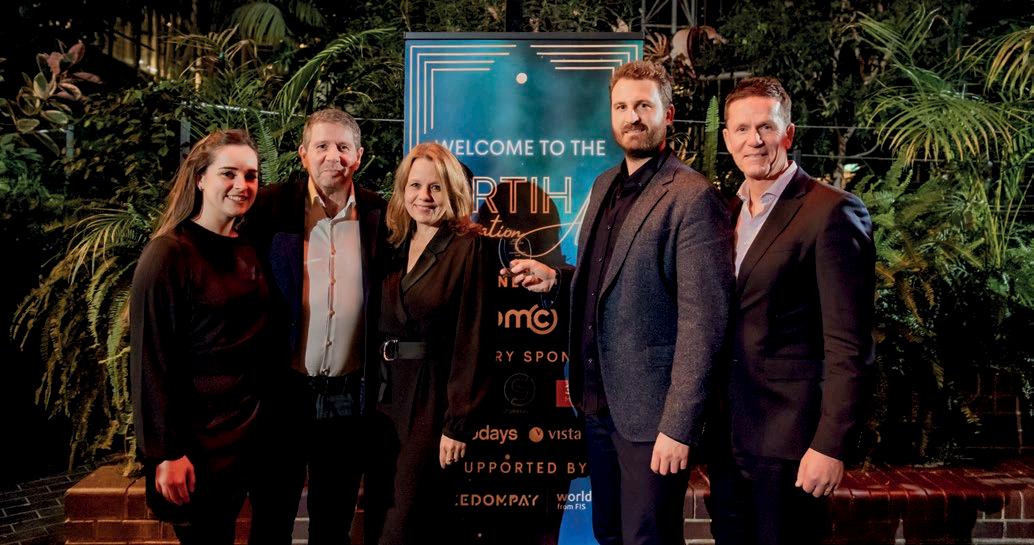
2023 RTIH Innovation Awards
Best Retailer/ Technology Supplier Relationship (UK)
WINNER Clix and B&Q Cardiff
HIGHLY COMMENDED: Barron McCann and Pets at Home
Best Retailer/ Technology Supplier Relationship (Rest of World)
WINNER
Nextail and Flying Tiger Copenhagen



2023 RTIH Innovation Awards


2023 RTIH Innovation Awards
A blended omnichannel approach is still necessary to delight and drive the customer experience
AOur roundtable discussion included the thoughts of EE, Primark, Footasylum, Crew Clothing, Studenac, and Headlam.
ttendees debated the future of physical and virtual store integration, under the moderation of Danny Rappaport, Director of Consulting at PMC, the metaverse, AI, security and theft prevention, social media and modern consumer behaviour and desires, plus the role of technology in meeting them instore or in the supply chain.
“There is a symbiosis now between online and physical retail offerings, with each supporting the other,” said Nina
Mimica, Chief Innovation Officer at Croatian retailer Studenac.
The relationship can be mutually beneficial or parasitic depending on how it is handled by the retailer. For instance, Studenac has 1,100 shops in Croatia now but also offers the Wolt delivery service, so you can get virtually ordered groceries delivered to your home.
“We’ve opened up small container pop-up stores of 14 square metres at Croatian beaches, festivals and so on along the Adriatic coast as well. This gives us a quick and easy way to
Future of retail is blended and data and experience led
Ahead of the 2023 RTIH Innovation Awards Ceremony, industry experts from the likes of Primark, Footasylum, Headlam, Marie Curie, Crew Clothing, Studenac and EE came together for a roundtable discussion at the Barbican Centre in the City of London.
2023 RTIH Innovation Awards
There
is a symbiosis now between online and physical retail offerings, with each supporting the other.
enhance our physical presence without undue paperwork, get growth, data, and so on,” said Mimica as she shared an experiential case study that was only possible because of technology that can supply stores, reserve goods, help marketing and so on in an integrated omnichannel approach.
The container project has now become an annual event and way of connecting with customers, driving sales and data collection. The retailer also has an expansion programme, which the customer and sales data collected from pop-ups can feed into, helping to make a decision about whether to open a permanent store in a location, buy a rival chain of local grocers, and so on.
AI and data
“Data is increasing everywhere. It helps with pricing, target marketing, branding, replenishment and deliveries in the supply chain and so on,” added Mimica, who went on to discuss how AI can help crunch this data.
Machine learning (ML) and robotic process automation (RPA) end uses in chatbots, automating stock pickers at Ocado warehouses, updating online stock checkers for customer usage, and multiple other applications from autonomous stores to front- and back-house

integration was also debated at the roundtable.
Social media is the modern equivalent of a market trader shouting out the trends aloud
However, augmented reality (AR) and the metaverse were currently no more than “a fairground showcase” for Mimica in the company’s consideration of how to use leading-edge technology.
Paul Edney, Technology Director, Channels at Primark, agreed with how important data is, commenting that the retailer uses it to tailor its products accordingly. “In Germany, for instance, they really care about
sustainability, so we emphasise that more than in the US, where the customer is much more price conscious.”
“Data is key now,” he added, especially as Primark is developing its Click and Collect offering, which is a “big opportunity for us to get the 60% of customers who don’t use our website to do so in future.” They can collect goods in-store in future, check out an online style match function, become more associated with the brand etc.
2023 RTIH Innovation Awards

A blended omnichannel approach is still necessary, however, to “delight” and “drive the customer experience (CX),” said Edney, as he shared how barbers, nail bars, vintage rails, and other in-store innovations can help shop profits and data collection for marketing purposes, while Primark’s online expansion plans continue. The brand keeps costs low by avoiding expensive returns and simultaneous standalone online shops. It blends the
A large percentage of tech budget is now going on security in-store
two approaches to market but remains agile to any developing trends.
Metaverse and social media
Lucy Grimes, Head of Retail Operations at EE, the mobile phone and broadband network provider in the UK that is owned by BT Group and has stores across the country, somewhat disagreed about the earlier attestation that AR and the metaverse isn’t relevant yet when she said that virtual experiences were vital in connecting with customers.
“We built a virtual EE store in the Fortnite game, for example, which must be defended against attackers, garnering prizes for participants,” she said, while adding these benefits can be accessed in the real and virtual worlds to provide linkage and integration between the two approaches. Data is the oil that fuels the link.
A blended approach to retail was recommended by the roundtable attendees, although it was accepted that the omnichannel approach in future may differ, comprising physical and digital stores, but less expensive contact centres in future. AI automation can increasingly handle a lot of customer enquiries in that field with less staffing than has historically been needed.
Social media can be a
crucial provider of customer data, sentiment and marketing led sales strategies. But Kevin O’Brien, Chief Information Officer (CIO) at Headlam flooring, advised that retailers should think carefully about who owns the data and the connection to the customer? “Is it you or the influencer,” he said, adding that the retailer can get a lot of data themselves anyway because customers will share contact details and other information that “they wouldn’t have done 30 years ago”.
Data can identify the best customers, sales lines, enhance customer ‘stickiness’ and so on. O’Brien shared how Headlam’s recent pop-up store in the prestigious Covent Garden location in Central London helped them gather marketing data and how “easy” it was to “spin up a store” now using online platforms like Shopify and cloud computing, and to mine the information with data analytics.
Guy Coates, Director at CADS, a firm that designs supermarkets and has worked with Primark, among many other customers, thought that “social media is the modern equivalent of a market trader shouting out the trends aloud” and couldn’t therefore be ignored. Ditto with the post-Covid rise in online shopping which has changed the way retailers think about shop design (they’re now additional marketing outlets as well as
2023 RTIH Innovation Awards
profit centres) and how stores align with online offerings.
Experiential regionalisation
Richard Noon, Composable Commerce Product Manager at Footasylum, which is a job title that takes the best components and technologies and combines them into a custom application, discussed how his firm launched the initially online only sevenstore high-end trainer and streetwear concept. It then opened regional shops with their own identities in Liverpool, Manchester, and London in the UK.
The sevenstore brand links up with local artists to drive regional in-store branding and uses AI driven data analytics to do regional customer targeting and variation across its stores. The data technology deployed also examines what ideas might be able to go nationwide – or even feed into
the wider Footaslyum estate – by crunching the numbers. sevenstore collects data to alert customers when their shoe size comes into stock for a particularly desirable sneaker, and they send personalised messages around birthdays or favoured designers foundational dates, and so on. “We’re getting to know a lot more about sevenstore customers,” explained Noon, while admitting the investment is only possible because they are high value customers who offer a return, therefore justifying the outlay.
Case study: EE Studio Stores
Asif Aziz, Retail Director, BT Group, shared an experiencebased case study from the EE Studio Stores in the UK, which are intended to not only sell mobile phones – a decreasing area for telco owned shops – but

Customers don’t think deeply about channels
also connectivity via broadband options. They offer a glimpse into the hyper-connected “living room of the future” or “kitchen of the future” as well, where the Internet of Things (IoT) idea of your fridge automatically ordering replacement foods online when it’s running low is common.
The EE Studio Store concept, which uses heatmapping to examine in-store customer behaviour, emerged victorious at the 2023 RTIH Innovation Awards.
“The idea is to drive more revenue and broaden our customer base,” said Aziz, who was candid about “necessity being the mother of invention” in this approach as traditional mobile telco shops in everyday high streets are facing profitability issues because consumers are replacing their phones less often.
This is why the EE Studio Stores are initially focused on high-end shopping centres in Manchester, London and Bluewater in Kent to reflect the pivot towards premium experiential services in-store.
Operating costs and returns
There is no magic silver bullet to success. Tech can help, but only if it aligns with the people and process in an integrated omnichannel fashion.
Complex and expensive returns policies for online retailers continues to be a problem. It is alleviated somewhat for blended companies that still have shops where goods can be returned and loaded onto lorries that are servicing the supply chain anyway.
“The numbers often indicate that direct online customers are the way forward. But once you drill down into the cost of returns, online advertising and so on it isn’t so clear,” said Mike Cadden,
Interim Chief Technology Officer (CTO) at Marie Curie, which runs charity shops in the UK, online donation drives etc.
The high cost of returns was debated at the roundtable alongside the other operational cost increases that retailers are facing from rising staff wages and rates, security prevention costs to stop thieves, and consumers just generally being more price aware than ever during the present cost-of-living crisis. This perfect storm means there isn’t much innovation budget left for retailers, in comparison to say a retail bank, but attendees did agree it’s still vital – and possible – to innovate.
Security concern and costs on the rise
“A large percentage of tech budget is now going on security in-store,” said Primark’s Edney, adding they are “now looking at security risk when deciding where we open a store.”
Losses from the rise in theft associated with the rise in the cost-of-living and a fall in police numbers is now a real concern for UK retailers.
Footasylum’s Noon commented “investment in this area has gone through the roof”, but this takes away budget from elsewhere. His firm uses RFID technology as a preventative anti-theft measure. But Toby Pickard, Global Insight Leader at IGD, also recommended using CCTV to identify known shoplifters and getting a guard to stand in that aisle, plus using weight triggers for expensive items picked up from shelves, and so on.
PMC’s Rappaport said: “The cost of stores is going up.” This
2023 RTIH Innovation Awards

The cost of stores is going up.
The fundamentals of retail don’t change. If you get the right product you will do well
is driven by increased security costs, wages linked to rising inflation, debt costs and many other factors. The fact that the global economy is struggling in the wake of geopolitical and macroeconomic factors like post-Covid debt, the war in Ukraine and spike in oil prices cannot be ignored.
Some of these costs apply to the online channel too, however, and they’re not necessarily in competition with stores anymore as the blended approach combining the benefits of both approaches to market becomes more common in the retail sector. Whatever money is invested during these tough times needs to show a return on investment or a cost reduction in the back office supply chain.
Conclusions
Whatever approach you take, Marie Curie’s Cadden reminded attendees that “customers don’t think deeply about channels” and the fundamentals of retail don’t change. “If you get the right product you will do well.”
The mantra of “right product, right price” was something Primark’s Edney agreed with as the roundtable concluded, “especially as budgets are presently tight.”
There is no magic silver bullet to success. Technology can help, but only if it aligns with the people and process in an integrated omnichannel fashion. Good planning, experience, and a zeal to meet the customer’s needs still count as the foundation stone to success.

COMPANY PROFILE VISTA TECHNOLOGY SUPPORT
Established in 1995, Vista Technology Support is the UK and Ireland’s largest independent provider of technology services in retail, hospitality, and pharmacy.
We manage the full technology life cycle for our clients, specialising in delivering technology transformation projects and providing ongoing remote and onsite support. Today, we are the only genuine end-to-end IT deployment and support service across the UK and Ireland, where all our services are delivered by our own people.
We pride ourselves on always being customer focused, proactive, solution-driven, and quick to resolve technology challenges and incidents when our customers are in need.
Whenever you need us, we’re there!
The Vista Life Cycle
With our award winning integrated technology service, Vista provides a multi-linked offering where dedicated account managers help your business streamline existing operations, implement necessary upgrades, or complete a holistic technology refresh.
Each layer of the operation works in a cohesive flow, as state-of-the-art systems and bespoke programs help your business operate without disruption. Our service has a true 360-degree approach that organically
There are more than 300 skilled and experienced professionals working at Vista.
extends to our office environment.
Each department is linked to the next (no more than three metres apart), ensuring we are always connected and always proactive in our promise of delivering a seamless, integrated service.
From IT service desk to onsite break-fix engineers, we have more than 300 skilled and experienced professionals working at Vista, who pride themselves on providing a solution-driven customer experience that complements our customers’ business goals.
Customer quote
“We recently completed an engineering services RFP. We considered all the UK service providers and Vista scored very highly on all our requirements, they were particularly strong in their engineering capability, use of technology and agility to implement change, Data cabling and projects and the icing on the cake was they provide all services in-house.” - Leading coffee shop chain
Vista’s Service Offering
360° IT Managed Services
Vista’s suite of managed IT services is designed specifically for retail and hospitality IT management. Our teams work in sync utilising a centralised ITSM toolset underpinned by the latest ITIL framework to allow for a seamless and processed experience between all teams.
Vista Technology Support
This toolset feeds into multiple applications to provide a tailored customer experience taking information from each stage to allow for proactive incident and problem management.
From this we can create bespoke reports and provide live dashboards that give our customers insight into the day-to-day IT operations of their business and what Vista are doing to help proactively improve this.
IT Service Desk
Our end-to-end service is driven by our highly skilled in-house team, who are ready to resolve first, secondand-third-line incidents at the first point of contact. We also manage third-party suppliers and resolver groups on behalf of our customers.
With a proactive approach, Vista has designed its technology service desk to seamlessly manage all IT system enquiries and incidents in a solution-driven, cost-effective way through our ITSM toolset. We’re proud to operate an ITIL certified service desk that is ISO 20000/270001 and SDI compliant.
Maintenance and Break-fix
Our maintenance contracts provide customers with peace of mind in the event of technology failure across the store, restaurant, or pharmacy. Our experienced team is on-hand to manage every element of the store’s requirement including the deployment of a highly skilled Vista employed field service engineer.
Once the FSE removes the defective part, it is returned
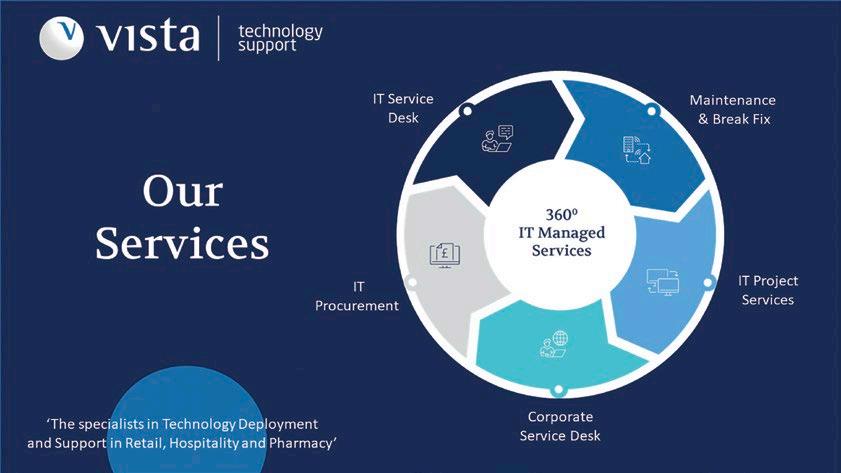
Vista Technology Support
to our repair centre to fix and place back into stock. Vista is proud of its retail IT maintenance credentials, and unlike smaller IT service providers, we offer a holistic end-to-end IT solution, delivered in-house using our own employed resources.
IT Project Services
Vista is the trusted IT projects delivery partner for some of the most well-known retail and hospitality businesses throughout the UK and Europe; with project capabilities spanning across 31 countries.
Vista’s in-house project managers and co-ordinators take ownership of the entire project, planning surveys, stock, engineering, staging and configuration, logistics, and structured cabling requirements.
We manage Installations, Moves and Changes (IMAC), ranging from store closures and refits to small volume technology replacements. Vista’s project services team also manages large-scale technology transformation projects for our customers.
Corporate Service Desk
The Corporate Service Desk (CSD) supports some of the largest restaurant and pharmacy businesses in the UK and Ireland. Vista’s expert teams are located at their customers’ head offices and provide a range of IT services to corporate IT users.
These services include AD management, provision of an IT walk-up desk and tech bar, office preventative IT maintenance and daily floor walks to engage with IT users to assist them.
The Vista CSD team builds a rapport with IT users and its aim is to resolve any technology challenges quickly and efficiently. The Vista CSD team also educates service users on how to best use technology and get the most out of their apps and IT accessories.
IT Procurement
Vista provides a range of IT sourcing and financing solutions designed to meet our customers’ technology strategy and budget requirements.
Vista’s IT procurement team will either work with customers on a case-by-case basis to source and procure their individual retail IT requirements, or where customers choose Vista’s IT Procurement as a Service (PaaS) model, Vista manages their customers’ IT purchase requirements on their behalf.
Vista | Panorama
Vista has launched Panorama, the beacon that shines a light on weaknesses within a business’s entire IT ecosystem.
Panorama provides IT execs with a holistic overview that highlights weaknesses in traditional physical, networks and cloud IT infrastructure. Vista is excited to introduce Panorama, our latest service, set to revolutionise the way traditional IT services are provided today.
Service fragmentation is a common theme in IT infrastructure, especially when business operations add Cloud, SaaS, SD Wan and ISPs into the mix. Until now, no single owner manages the modern endto-end IT architecture, leaving IT departments and service desks to resolve the issues through a process of elimination.
This is where Panorama transforms the performance of business systems, providing a global view of the entire IT infrastructure, and proactively problem solving before the technology user or customer is impacted. This approach can dramatically reduce the number of IT related incidents and subsequent IT costs.
Panorama is not a remote monitoring and management tool that monitors the performance of individual physical IT assets, it is an IT systems beacon that is actively looking for performance issues that will impact stores, restaurants, cinemas and pharmacies, in fact any organisation where colleagues depend on technology to provide their service to the customer.
To find out how Vista can provide award winning IT solutions for your business, please contact our experienced business development team on sales@vistasupport.com | 0330 135 5795




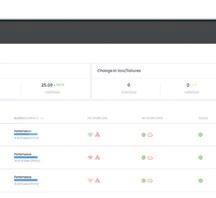







Shining a Beacon on the Modern Physical IT and Cloud Architecture














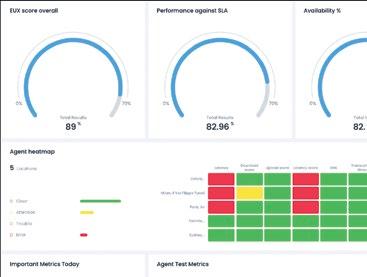






















Service fragmentation is a common theme in IT Infrastructure, especially when business operations add Cloud, SaaS, SD Wan, ISP’s into the mix. Until now, no single owner manages the modern end-to-end IT architecture, leaving IT departments and service desks to resolve the issues through a process of elimination.
This is where Panorama transforms the performance of business systems, providing a global view of the entire IT infrastructure, and proactively problem solving before the technology user or customer is impacted. This approach can dramatically reduce the number of IT related incidents and subsequent IT costs.








With a holistic overview that highlights weaknesses in physical and cloud IT infrastructure, Vista is excited to introduce Panorama, our latest service, set to revolutionise the way traditional IT services are provided today.
Panorama is not a remote monitoring and management tool that monitors the performance of individual physical IT assets, it is an IT systems beacon that actively looks for performance issues that will impact stores, restaurants, cinemas, pharmacies, in fact any organisation whereby colleagues depend on technology to provide their service to the customer.
To find out how Vista can provide award winning IT solutions for your business, please contact our experienced business development team on sales@vistasupport.com | 0330 135 5795

superior functionality and connectivity
for tablet and cloud PoS applications
Without a doubt, a growing consumer appetite for multiple ordering and delivery options coupled with rising consumer expectations is driving demand for advanced print and labelling solutions that deliver feature rich innovative technology. For retailers looking to develop or expand their offering, having access to such technology alongside a range of connectivity options offers the functionality and versatility, as well as reliability, required to provide a comprehensive customer experience.
Synonymous with innovative design, seamless integration and a wide range of retail applications, the latest additions to the mC-Print™ PoS printer series from Star, the mCP31CI and mCP31CBI, have been designed to provide superior functionality and connectivity.
Star’s USB-C interface with 20W Power Delivery supports iOS, Android and Windows devices for tablet PoS connectivity, whilst the printers also feature Ethernet LAN, USB-A hub, integral Bluetooth connectivity (mCP31CBI) and optional WLAN. For Cloud PoS applications, Star’s next generation CloudPRNT™ technology is included as standard for fast,
reliable online ordering and omnichannel environments with support for the latest progressive web applications.
In addition to their enhanced connectivity both printers offer a range of unique and innovative features. A high print speed guarantees large volume transactions are handled with ease, whilst flat receipts are ensured
thanks to Star’s print flat technology. Moreover, Star’s unique cash drawer connection sensing feature allows the printer to distinguish an open drawer or one which is completely disconnected, enhancing security. The information can be reported directly to a locally controlling application or via the cloud.
Given the continued growth in selfservice and self-checkout applications, the compact design of the mCP31 renders the printer an ideal packaged kiosk printing solution, offering ease of integration and simple front paper loading.
Efficient and sustainable labelling solutions
With the rise in multichannel ordering across retail and hospitality in recent years accompanied by increasing demand for customer collection, third party delivery and legislation around accurate ingredients and allergy identification, the requirement for efficient labelling solutions has surged. Amongst the range of labelling solutions currently available, linerless labels stand out for their eco-friendly properties and operational efficiencies.
For all linerless media, a key benefit is the reduction in waste. With no backing paper to discard, linerless media offers significant paper saving properties with more labels per roll than standard label rolls. Thanks to fewer roll changes alongside the advantage of reduced shipping costs and storage space requirements as linerless labels are more compact than traditional labels, cost savings can be achieved as well as enhanced operational efficiency and sustainability.
In terms of label size, linerless media is available in a range of widths, enabling businesses to create labels for any product type including larger labels for deliveries to smaller, more compact product labels and swing tickets. Equally, variable length linerless labels enable the printing of shorter orders or labels with less information on minimal paper,
further promoting efficiency.
As demand grows for labelling products in a variety of sectors, Star’s mC-Label3 and TSP143IVSK printers have been designed to print permanent and repositionable labels within retail encompassing product and stock labels as well as delivery and returns labels.
Thanks to its ability to print on a wide range of liner-free media including low adhesive re-stick labels as well as high adhesive permanent and semipermanent labels, the Star mC-Label3 printer offers the ideal solution for printing different sized and types of labels from one easy-to-use device.
Capable of printing traditional liner pre-sized labels, continuous label rolls and on receipt paper with fully adjustable widths from 25mm to 80mm wide, the printer is ideal for businesses that use a variety of media or are planning to move from traditional labelling to linerless media in the future.
Alternatively, for businesses seeking a compact linerless-only label and order printing solution the TSP143IVSK boasts optimal versatility and ergonomic design, printing on low tack linerless re-stick media



from 40mm to 80mm. Moreover, the TSP143IVSK benefits from a four-year warranty as standard.
The mC-Label3 and TSP143IVSK benefit from multiple interfaces for local PC, network, tablet and cloud connectivity. Furthermore, both printers include direct sync and charge with supported tablets, together with hub connectivity to connect a scanner or customer display for an ‘all-inone’ solution.
mC-Label3 additionally features Bluetooth connectivity, whilst the printers equally benefit from a Wireless LAN option with Star’s MCW10 module. Star’s CloudPRNT technology is included as standard on both models for printing directly from central ordering platforms and websites.
Visit Star Micronics at Retail Technology Show 2024 (Stand 6G10) to discover a wide range of printing, labelling and kiosk solutions as well as PoS peripherals. Star’s experienced technical team will also be on hand to provide tailored advice for your retail business.
For further information, please call +44 (0) 1494 471111 or visit: www.Star-EMEA.com
 Star Micronics mC-Label3 and TSP143IVSK.
Star Micronics mC-Label3 and TSP143IVSK.
Comment




Stay focused amidst tech and innovation hype
Imagine you’re on a TV game show. The host challenges you to list as many retail technology opportunities as possible in 30 seconds.
Ready, set, go! From mobile apps to robotics, from Big Data to the latest payment tech. We can’t forget AI or the metaverse either, perhaps the most iconic examples of tech hype. But with all of these concepts, a genuine challenge emerges: how to choose meaningful changes amidst the plethora of tempting innovative ideas.
Each ‘groundbreaking’ technology opportunity comes with what initially
appears as a no-brainer business case. Alluring case studies make it easy to justify adding another idea into the already full roadmap. However, we can’t do everything and not every idea will be the slam-dunk it first appears to be. Furthermore, what represents a brilliant idea for one retailer will be a confusing mismatch for another.
‘Shiny object syndrome’ constantly tempts us to chase the next big thing, but we risk overcommitting our
limited resources and encouraging organisational burnout. To avoid this, identifying valuable opportunities requires us to decipher the hyperbole from the genuinely transformative changes for our unique status quo.
Aligning tech projects to our North Star
Your transformation journey will be tailored to your status quo. Recognise that your competitors are on their own
Hyped-up innovations can distract and redirect us from our goals whilst consuming precious resources
transformation journey, so be careful of ‘me-too’ initiatives which can quickly blow you off course.
We must develop the confidence to focus on our own destination whilst avoiding the temptations of the wider market. Sometimes we’ll be clear on the specific approach whereas on other occasions, we’ll need to experiment and explore the appropriate route as we go. Either way, we must not lose sight of our North Star.
Aligning innovations with the company’s objectives, strategy, and overarching purpose, or North Star, is critical. Our North Star acts as the compass to guide us to a more positive future state. Our customers are relying on us to focus on delivering meaningful value and not be distracted by other initiatives.
Consider how you are using your North Star to focus attention and align the organisation on what matters most. For example, Screwfix is committed to helping customers “get their jobs done quickly, affordably and right first time”. This drives their innovation and change agenda, leading to successful initiatives such as Screwfix Sprint.
The North Star should help us refine ideas, but it’s likely we’ll have excessive options left on the table. Prioritisation, an increasingly essential skill, is about filtering what to do and what not to do.
Some concepts have specific benefits whilst others will be vague or intangible. Equally, some stakeholders will be vociferous about the “must do” initiatives, whilst others remain cautious. Despite this variation, we must compare all options when deciding where to invest our precious resources.
I’m sure we’ve all been in those
prioritisation meetings where everything comes out as ‘top priority’. But in these instances, we can’t deliver effectively on anything, so we remain distracted, overstretched and overwhelmed.
Instead, consider additional factors than the traditional metrics like return on investment. Reflect on the impact for customers and how it tangibly boosts (or detracts from) their experiences and perception of the brand. Also try factoring in the implications of how we treat people and the planet. Reframe prioritisation as a method to decide on what not to do.
There is no right answer for prioritisation, but that doesn’t mean we shouldn’t try. Consider the genuine impact of any given innovation and whether this is worth the effort and resources to unlock.
Once priorities are set, we must rely on one of retail’s strongest capabilities: getting things done. We must enable technical specialists to deliver without dividing their attention across multiple concurrent and competing projects. Consistent focus also makes communication clearer, maximising the chances that people will support and adopt the change.
recognising the need to continually adapt to the ever-evolving world.
We’re responsible for realising the future
With new innovations emerging on a daily basis, it’s an organisation’s ability to execute changes which acts as the bottleneck. Hyped-up innovations can distract and redirect us from our goals whilst consuming precious resources. Therefore, the organisation looks to you to make informed decisions and stay focused on what matters most.
So if you’re guided by your North Star, prioritise effectively and remain both focused and flexible then you can overcome the hype and the red herrings. Instead, you’ll be focused on delivering meaningful change that truly benefits customers, colleagues and the company.
About the author:
Oliver Banks is a consultant working with senior leaders to transform retail businesses. He’s the author of ‘Driving Retail Transformation: How to Navigate Disruption and Change’. Find him on LinkedIn or discover more at www. DrivingRetailTransformation.com
Driving Retail Transformation: How to Navigate Disruption and Change is available now.
creating and assessing and experimenting
However, in our volatile world, we must simultaneously remain flexible. The way that the retail industry pivoted quickly during the pandemic is a great example of this flexibility. Amazon demonstrate excellent flexibility whilst continually creating and assessing and experimenting with new concepts, but then they are also excellent at delivering changes to realise the benefits of their innovations.
In today’s world, remaining flexible means accepting if ideas aren’t working or if assumptions change whilst also


Introducing The RTIH Retail Technology Innovations Report
RTIH is pleased to announce the launch of its second Retail Technology Innovations Report, sponsored by 3D Cloud by Marxent.
This highlights the top 50 retail tech plays of the past 12 months as decided by our Editor, Scott Thompson, and an independent advisory panel.
We were looking for groundbreaking technology deployments, launches, and pilots from across the omnichannel retail landscape, be they payments, supply chain, online, mobile, physical store etc related.
Thompson produced a longlist which then went to the advisory panel, consisting of:
Mike Cadden, Interim Chief Technology Officer, Marie Curie
Matt Taylor, Technology Transformation Leader at EY, Retail and Consumer Products
Christine Russo, Retail Industry Analyst
Carole Kingsbury, Former Director of IT, Ted Baker
Peter Waugh, Director, International Digital (EMEA, LAC & AP), Starbucks
Nadine Neatrour, Marketing Director, Selfridges
Matt Bradley, Director and Founder, Retail Technology Show
They picked their stand out retail technology plays, put forward their own favourite innovations, and, based on this, Thompson drew up the final 50.
Innovation and technology play a critical role in the success of the retail sector, and it is great to celebrate this with the 2024 Retail Technology Innovations Report.
Many thanks to 3D Cloud by Marxent, which provides 3D product visualisation software trusted by top furniture and DIY retailers, for sponsoring it.
Physical retail
Sticky
UK-based startup Sticky picked up the Innovative Product of the Year award at Smart Retail Tech 2024, which took place in February at London ExCel. It beat out Bango and Consumer Insights Lab to secure the gong.
The company enables retailers to turn more of their physical space into Points of Sale, and last year secured £1.5 million to fund its expansion plans.
Sticky uses its own operating system with NFC technology to enable companies in sectors such as retail, hospitality and health and fitness to process payment transactions in less than ten seconds.
Asda
Asda has been testing out gamified learning for those employees getting to grips with its new checkout system.
This has been taking place at the grocery giant’s Goldthorpe store in Rotherham, in partnership with Attensi.
In a LinkedIn post, Bruce Gibb, Learning Design Manager at Asda, said: “Gamified learning
Retail Tech Innovations Report

Waitrose and WRAP have trialled PoS messaging to encourage more customers to buy fresh produce loose.
in Asda is live! Delighted to have landed new checkout training in line with our new checkout system in the pilot store this weekend.”
He added: “This has been a project I have been lead on since taking my Learning Design role on and it’s fantastic to see it come to life.”
“The reaction from the Goldthorpe store leadership and colleagues has been fantastic, they transitioned from the games to the live environment effortlessly and the competitive nature of the solution engaged a desire to practice and repeat, driving confidence and capability.”
Retail Tech Innovations Report

McDonald’s
McDonald’s has served up an immersive campaign that celebrates manga and anime. This went live on 26th February and saw the fast food giant change its name to WcDonald’s.
Guillaume Huin, Sr. Marketing Director at McDonald’s, said this was “as an homage to the name used for decades in mangas and anime to refer to McD. New logo, Japanese name, flipped arches, new exclusive packaging, WcNuggets and a new WcDonald’s sauce with quite a spicy kick - we are officially WcDonald’s now.”
He added: “To honour the art of manga and anime, we have partnered with the legendary Japanese animation Studio Pierrot (Bleach, Naruto) and Acky Bright, a brilliant Japanese manga artist, to release four mini episodes and short mangas, once a week.”
The mangas were unlocked via a QR code on packaging or in select manga stores across the US. Each episode and manga covered a different genre of the anime world, going from shoji (romance) to shonen (action), fantasy or mecha battles. And each had its own characters.
Dartmouth’s Tuck School of Business
Mashgin reports deployment of its self-checkout technology at Dartmouth’s Tuck Scool of Business in Hanover, New Hampshire.
New touchless self-checkout kiosks speed up the checkout experience for Tuck students, with average transaction times at Mashgin kiosks said to be between 10 and 16 seconds.
These use AI powered computer vision to recognise and ring up objects up to 10x faster than traditional checkout with a cashier. Mashgin instantly identifies packaged goods, produce, and open plated food items (e.g., a piece of fruit, salad, combo meal plate) from any angle. Consumers place their items on the kiosks and are ready to pay without barcodes, apps or RFIDs. “We initially piloted Mashgin’s technology in a 24/7 unmanned convenience store. Our students loved the technology and ease of use,” says Amelia Heidenreich, General Manager of Tuck Dining and Catering. “We decided to add a second unit to our dining hall to increase the speed of service, and we may consider deploying more.”
Boxbar
Boxbar has launched what is pitched as the world’s first ever automated self-serve, full menu drinks solution.
This allows event organisers and venue operators to serve up to eight different beverage types all from the same terminal. It has the ability to serve beers (including Guinness), ciders, wines, cocktails, spirit and mixers and soft drinks from a
single terminal.
“Beverage sales are key to the success and profitability of businesses, yet bar service is still defined by a dwindling pool of trained staff, excessive queuing, long wait times, throttled sales and frustrated customers,” says Reshad Hossenally, Boxbar CEO and Co-Founder.
“With Boxbar we’re 360% faster, serving two drinks in 30 seconds. We’ve seen firsthand how much this can affect queuing times, on average dropping by over 70%. Simply put, fans enjoy a far better experience whilst operators increase efficiencies and sales, reduce overheads and boost profitability.”
Carrefour Belgium
Carrefour Belgium has opened its smallest store in Belgium, measuring just 18 sqm.
Retail Tech Innovations Report
BuyBye by Carrefour is located at the retailer’s Belgian headquarters in Zaventem (near Brussels). The autonomous store consists of a series of refrigerated vending machines where customers can purchase lunch, snacks, cold drinks and fruit.
Shoppers need to download the Carrefour BuyBye app, create an account and add a payment method before they can use the app to open the machines, take out products and check-out.
This is the result of a collaboration with startup Reckon AI. In a LinkedIn post, the latter said: “Picture this: aisles guided by AI, curated sections tailored to your needs, and an immersive shopping experience like never before. This store isn’t just a place to shop; it’s a destination where innovation meets your everyday needs.”

Plans are afoot to roll-out the concept to Carrefour Belgium’s existing physical stores.
Żabka Polska
Żabka Polska has launched its first ever store that is open 24/7 and offers both a traditional and autonomous shopping option.
In a LinkedIn post, Patryk Powierża, Head of Nano Growth at Żabka Polska, said: “We have opened the first hybrid Żabka store powered by autonomous technology (supplied by AiFi).
How does it work?”
“From 6am-11pm, the store operates like a traditional store with a cashier. From 11pm-6am, it is switched to an unmanned format, which enables autonomous shopping. Thanks to that we can extend opening hours, be available 24/7, and deliver a great retail experience to Polish customers.”




We’re always striving to make customers’ experiences even better and more convenient
New touchless self-checkout kiosks speed up the checkout experience for Dartmouth’s Tuck School of Business students.
Retail Tech Innovations Report
Netto
German discount chain Netto has opened what is pitched as Europe’s largest autonomous supermarket in Regensburg.
The 800 sqm location enables customers to shop without registering, checking in or self-scanning. An intelligent camera system records every movement and assigns products taken from the shelf to each shopping basket. This is done without collecting any personal or biometric data. Fruit and vegetables are automatically weighed and added to baskets as soon as they are taken off the shelf. Once finished, customers can make their way to one of two fast exit terminals. The store uses technology from Trigo,
the company behind Aldi’s autonomous stores in Utrecht and Rewe’s pilot in Munich. In addition to the fast exit terminals, the shop also has regular service and self-service checkouts.
It features the latest extension of Trigo’s EasyOut system, with the company adding the capability for shoppers to review their receipts, approve and pay, before they leave the store.
The new EasyOut Station generates shoppers’ receipts in real-time while utilising the fast exit terminals. Payment is made by card, Apple Pay, Google Pay or the Netto app. Using the app also enables shoppers to automatically redeem coupons and archive the paperless receipt within the app.
EE
In February, EE unveiled its latest Experience store alongside former Newcastle United player Shay Given in the Metrocentre, Gateshead, one of Europe’s largest indoor mall style shopping centres.
This is the fourth of EE’s Experience stores and the first of more than ten brand new Experience and Experience Local locations set to open in the UK over the next year.
The announcement came as EE committed to investing £6 million in the British high street in the next 12 months. Its belief in physical retail has seen the launch of new store formats including its flagship Studio store in London, Experience stores in Manchester, Cardiff and Kent, and

most recently its Experience Local stores in Derby and Guildford.
The new retail strategy was announced in June 2023 with the launch of the EE Studio store in Westfield London, White City, featuring an immersive Digital Spa to support customers’ wellbeing and a Gaming Zone.
Footasylum
Embracing a MACH approach, Footasylum has collaborated with NewStore and Talon.One to deliver omnichannel shopping experiences across its stores.
The project, which was led by Absolute Labs, leveraged NewStore’s modular, mobile first platform, to integrate Footasylum’s physical and digital channels, providing customers with a seamless online and instore shopping experience.
The roll-out, coupled with Talon. One’s promotion engine, also facilitated omnichannel purchasing journeys that significantly enhanced brand engagement.
Retail Tech Innovations Report
Jisp
Jisp’s AR powered Scan & Save loyalty and rewards offering is now live with Sudheesh Pallikulangara, whose business Sudi’s Stores has eight sites across the northwest of England.
These are predominantly in the Blackpool and Lytham St Annes area, offering customers a broad convenience range and services. Scan & Save will bring discounts and loyalty rewards to help manage customers’ shopping budgets.
Sam Halliwell, Operations Manager overseeing the eight stores, says: “We’ve been researching the market and had seen the benefits Jisp Scan & Save could bring to a retail operation.”
“Given the cost-of-living crisis we felt it was the right time to bring it into our estate, both as a way of rewarding our customers with great deals and loyalty payments and helping to grow our sales and profitability.”
Sustainability and inclusivity feature heavily in our latest innovations report
Inter Miami CF
American soccer club
Inter Miami CF has opened Zippin powered checkout-free stores at Chase Stadium, its home ground.
These went live ahead of the new MLS season, which kicked off in February.
“We’ve been working tirelessly during our short offseason to introduce technology to decrease wait times and expand the variety of our exceptional food offerings with the goal of elevating and providing a memorable match day experience to our fans at Chase Stadium,” says Laurence McMillon, Director of Food & Beverage.
Jisp’s
AR powered Scan & Save loyalty and rewards offering.

Four Zippin powered checkout-free stores have been launched. These are the first outdoor checkout-free stores ever deployed in existing structures and tents.
Shoppers enter with a valid payment method (credit card or mobile wallet) and pick the items they want. Upon leaving, they are automatically charged for the items they take (if they picked something up and put it back, they aren’t charged if they don’t leave with it). Shopping typically takes just 30 seconds or less.
Retail Tech Innovations Report

Online retail
TikTok
TikTok is working on a new in-app Trendy Beat shopping section, offering products that are shipped and sold by a subsidiary of its parent company, ByteDance.
This is currently being tested in the UK and features popular items that have appeared in trending videos. The move can be viewed as TikTok looking to take on the likes of Amazon and Shein, indicating, as it does, a shift from a current e-commerce strategy dominated by the TikTok Shop marketplace.
TalkShopLive
Video commerce and retail media enablement platform
TalkShopLive has announced the launch of its new Shoppable Simulcast feature with Instagram.
The product officially debuted in March with a livestream featuring Grammy nominated artist, producer, songwriter, and actor Benny Blanco.
This featured Blanco preparing recipes from his new cookbook and entertaining guide, titled Open Wide, and also streamed in association with TalkShopLive media partner Billboard. Blanco also signed copies of his book.
The live event was embedded across multiple destinations, including Billboard.com and Billboard’s Instagram and Facebook page, Blanco’s
Instagram and Facebook page, TalkShop.Live and across TalkShopLive’s content distribution network.
Any TalkShopLive stream can be simulcasted on a seller’s Instagram account while still keeping the shopping element intact. The Instagram integration comes after TalkShopLive launched its Shoppable Simulcast product and first destination with Meta on Facebook.
L’Occitane
L’Occitane Middle East has tapped Confer With’s live video shopping technology to enhance its online platform.
This allows customers to interact in real-time with knowledgeable brand ambassadors, bringing the in-store experience to the digital realm.
TalkShopLive’s new Shoppable Simulcast feature with Instagram.
Retail Tech Innovations Report
AI
Physical stores remain a hugely important piece of the omnichannel retail puzzle
The Very Group
The Very Group recently brought the entire company together for an event entitled, Very Con: AI in Action.
CIO Matt Grest said: “It’s always going to be a big call to bring the whole company together for an AI immersion day, but as a business we have made huge strides over the last 12 months in powering the business using genuine AI and I really wanted to keep up the momentum and bring more colleagues into the fold.”
Microsoft, Samsung Electronics, Meta and Multiverse - great energy in the office all day from everyone.”
The big reveal of the day was the launch of VeryGPT, a generative AI chatBot that will be available to all employees.
“Given JD.com’s muscle in Asia (and globally) this could be very influential in driving GenAI adoption. It may be early days for where it has made a difference, but anything the company does is well worth looking at.”
The
He added: “We had a fantastic day where we were able to outline our strategic ambitions, we had colleagues demonstrating how we’re already leveraging genuine AI across the business and saw many great demonstrations from our valued partners in Amazon Web Services (AWS),
Grest said: “This gives everyone access to a new tool that they can use to support their daily activities, in a safe and secure environment with appropriate guardrails. We’ve already been able to demonstrate some amazing productivity gains from colleagues using VeryGPT during our internal trial, and I can’t wait to see what colleagues are going to do with this now that it’s rolled out to all.”
JD.com
JD.com has unveiled its ChatRhino (Yanxi in Chinese) large language model (LLM), designed to serve various industries.
Our judging panel said:

Matalan
Matalan has partnered with Kin + Carta on a GenAI and Large Language Model (LLM) tool, which creates detailed product descriptions for items listed on its website.
The move is pitched as the first time a UK retailer has used AI in this way and forms an important part of Matalan’s digital transformation journey. The tool will be implemented across all departments, including clothing and homeware.
L’Oreal
L’Oreal and NTT DATA have partnered to create Lore, a virtual beauty advisor powered by the latter’s conversational AI platform, Eva.
“The development process of this solution was challenging and, simultaneously, very rich in learning. We trained the virtual beauty consultant for months to ensure that it would achieve its goal to provide consistent and responsive answers, even in the most complex situations,”says
Santiago Santa María, Director of Conversational AI at NTT DATA.
Lore makes recommendations to customers and advises on beauty products based on their needs, redirecting them to the brand’s online store, or letting consumers shop within the same application.
Retail Tech Innovations Report
Ikea
Ikea has launched an AI powered home design, inspiration and shopping tool, available exclusively on the OpenAI GPT Store.
It says that the move marks “a significant step in democratising planning services and creating a better life for the many, by offering a tool that gives users personalised furniture and decor suggestions based on factors such as room dimensions, personal style, sustainability preferences, budget, functional requirements, and more.”
“The new Ikea AI Assistant on GPT Store is an ongoing initiative, and the continuation of a journey that looks to enrich the retail experience and explore additional avenues to interact with our customers and co-workers, as they help us improve and develop further,” says Parag Parekh, Global Chief
Digital Officer at Ikea Retail (Ingka Group).
Metro Brands
Metro Brands, an Indian footwear and accessory specialty retailer, has entered into a partnership with Nextail, a merchandise planning platform.
The long-term agreement encompasses a number of AI driven solutions across buying and merchandising.
Metro Brands operates more than 800 stores across over 180 Indian cities, with plans to open approximately 200 by FY 2025. It says that, through accurate demand forecasting and decision automation, the Nextail platform will ensure product availability across its rapidly expanding store footprint.
Amazon
Doug Herrington, CEO Worldwide at Amazon Stores,

recently took to social media to discuss Rufus, a new GenAI powered conversational shopping experience.
Launching in early 2024 in beta to a small subset of customers in Amazon’s mobile app, this will roll-out to additional US customers over the coming months.
Boots
Boots is working on the launch of a ChatGPT personal shopper for its website which would be able to give customers recommendations on lipsticks and beauty gifts.
The retailer, which in 2023 announced plans to close 300 stores around the UK amidst a rise in online sales, has a partnership with Microsoft - the biggest investor of ChatGPT’s owners OpenAI - and already implements the chatbot in other areas of its business.
Boots is also deploying Ocula Technologies’ Ocula Boost solution. The AI platform addresses abandoned shopping carts by analysing sites to: identify actions to improve the customer experience, accessibility and performance; rank insights based on predicted value and effort; and ensure teams focus on the right areas.
Supply chain
Wiliot
Wiliot’s IoT platform connects digital and physical retail
worlds using its stamp sized IoT Pixel devices to address challenges across supply chain efficiency, omnichannel retailing, food safety, and inventory management.
Once attached, the IoT Pixels connect to Wiliot’s cloud and retailers are equipped with real-time, item level visibility into every product within their supply chains.
To quote our judging panel: “A product that is Bluetooth enabled, self-powered, programmable, and 100% traceable is a real winner for any and all organisations, not just retail.”
Shein
Chinese fast fashion giant Shein is marketing its supply chain technology to global brands and designers.
It’s a smart move, according to Brittain Ladd, a supply chain consultant and former Amazon executive.
“Shein and Temu are both doing exactly what I stated they would do when I first started writing about the companies two years ago,” he says. “Primarily, they are following the Chinese business playbook written so well by Alibaba, Pinduoduo, and JD.com - provide an ecosystem of options and services that are open to all.”
Shein’s Executive Chairman, Donald Tang, announced the aforementioned plan in a letter to investors, allowing outside brands and designers to leverage his company’s tech for testing out new fashion items in small batches and tracking how popular they are with consumers.
Tang called the new initiative “supply chain as a service.”
Retail Tech Innovations Report
Shein is following the Chinese business playbook written so well by Alibaba, Pinduoduo, and JD.com - provide an ecosystem of options and services that are open to all
Kingfisher
Kingfisher has launched what is pitched as the first AI powered assistant in the home improvement sector, harnessing the capability of generative AI to support customers with their DIY projects.
Launching initially at Castorama France, this answers customers’ DIY queries and provides step-by-step advice on a range of home improvement projects, as well as tailored product recommendations.
Customers can ask the assistant questions in natural language while shopping online. It will answer in a friendly and conversational way with relevant advice. As well as conversing with customers via text chat, the assistant will soon be able analyse photos to perform visual searches and answer visual queries.
It will initially provide advice in relation to power tools, before being extended to cover Castorama’s full range of products. It is capable of operating in multiple languages, and if it proves successful, it will ultimately be rolled out to other banners across the Kingfisher Group.
To power the assistant and support other future applications of AI, Kingfisher’s data team has developed a proprietary AI orchestration framework, named Athena. This will manage prompting and interaction with a range of large language models, as well as other AI tools developed inhouse. It incorporates a range of controls to ensure security and protect against sensitive or inappropriate content.
Kingfisher has launched what is pitched as the first AI powered assistant in the home improvement sector.

Retail Tech Innovations Report
Newegg
Newegg, an online retailer specialising in technology products, has deployed Geek+’s shelf to person picking system that uses autonomous mobile robots (AMR) in its Ontario, California, warehouse.
The robots operate within a designated area before lifting and carrying mobile shelves to workstations where employees pick and scan products to prepare them for shipping to customers.
The Geek+ system includes 24,360 storage locations for products within hundreds of shelves.
flaconi
GreyOrange has been selected by flaconi, a Germany e-retailer for beauty and perfume, to improve overall warehouse operations for faster, more efficient distribution to its customers.
flaconi is leveraging GreyOrange’s GreyMatter fulfilment orchestration platform in combination with a fleet of 70 Ranger Assist robots. Utilising the Robots as a Service (RaaS) and Software as a Service (SaaS) model, based on demand, flaconi says that it now has peak season flexibility for the warehouse.
It can fulfil orders quickly by leveraging dynamic zoning, hybrid picking, and GreyMatter’s balanced distribution of work to the robots according to fulfilment needs.
Dexory and Iron Mountain
Dexory, a provider of AI and robotics solutions, has announced a partnership with Iron Mountain, a specialist
in information management, storage, data centre infrastructure, and asset lifecycle management.
Since 2021, Iron Mountain has expanded into a third-party logistics (3PL) provider, with the aim of disrupting the warehouse and logistics industry with its solutions. The company has chosen to adopt DexoryView as its preferred inventory and tracking solution at four warehouses across Kettering Symmetry Park, Lutterworth Magna Park North and Rugby Symmetry Park.
Iron Mountain, which lays claim to more than 225,000 customers around the world, was looking for an automated solution to inventory management and space optimisation for these warehouses, rather than opting for a more traditional and manual intensive route.
Using Dexory’s technology, combining analytics with autonomous robots, it will be able to scan 15,000 locations per hour, without impacting its day-
to-day operations. This allows the company to analyse its pallet lifecycle within its warehouses. In addition, it is able to gather full visibility of stock and track inventory movements.
Online delivery
DoorDash and Wing
DoorDash and Wing have announced the launch of their drone delivery partnership in the US, starting in Christiansburg, VA. Select local consumers will be able to order eligible menu items from Wendy’s - the pilot’s first restaurant partner - through the DoorDash marketplace and have them delivered via drone.
Domino’s Pinpoint Delivery has gone live in the US.
This follows a pilot programme that the pair launched in Australia in 2022 and has since expanded to GreyOrange and flaconi have teamed up.


three locations in Queensland with over 60 participating merchants, marking the first time that Wing integrated its drone delivery service within another marketplace.
Green retail
Waitrose and WRAP
Waitrose and WRAP have trialled Point of Sale messaging to encourage more customers to buy fresh produce loose to cut household food waste, save money and reduce single use plastics and unnecessary packaging.
This took place in Waitrose’s Thatcham store near Reading and included the use of eye tracking software to follow shoppers’ unconscious reactions.
People were recruited by a specialist research company to take part in this element of the study. This involved wearing hardware while they shopped to track their eye movements and identify which signage had been viewed and for how long.
Reiss
Fashion retailer Reiss has announced a partnership with AI powered verification platform Compare Ethics as part of its commitment to sustainability and the use of responsible materials and standards. Said platform evaluates and ranks the quality of green claims against regulatory requirements,
Retail Tech Innovations Report

and offers actionable steps for achieving full compliance. It will verify between 3-14 data points for every sustainability claim made by Reiss, with the aim of ensuring compliance to all regulations and reducing internal workload.
Ocado Retail
For the first time, Ocado customers are able to receive a 20p monetary reward for scanning and recycling packaging using their smartphones.
The retailer has teamed up with Polytag and Bower to deliver the initiative. Customers can scan a QR code printed onto Ocado’s own brand two and four pint milk bottles.
The first 20,000 codes scanned will see consumers receive a 20p reward which will appear in their digital wallet in the Bower app – the same amount that will be redeemed as a deposit in the upcoming Deposit Return Scheme legislation once it is rolled out in 2025. This 20p can then be withdrawn to their bank account.
Although consumers will not redeem a deposit – as it will
Domino’s Pizza
Domino’s Pizza is introducing Domino’s Pinpoint Delivery in the US, a new technology that allows customers to receive a delivery in such places as parks, baseball fields and beaches.
Customers with the Domino’s app can select the service, drop a pin on the map and get pizza delivered pretty much anywhere, the retailer says.
“We’re proud to be the first quick service restaurant brand in the US to deliver food to customers with the drop of a pin,” says Christopher Thomas-Moore, Domino’s Senior Vice President – Chief Digital Officer. “We’re always striving to make customers’ experiences even better and more convenient, and Domino’s Pinpoint Delivery does exactly that.”
not be added at the point of purchase – the partnership aims to demonstrate the viability of a DDRS by enabling people to receive a cash incentive for recycling using their smartphones.
DPD UK
In pursuit of its net zero 2040 goal, DPD UK has launched the EcoLaunchpad programme, where it reaches out to experts in sustainability, technology, and innovation to develop and test new ideas that can help it further reduce its carbon footprint.
It ain’t easy being green, but many retailers and brands are nonetheless doing sterling work in this space
Partnering with L Marks, a global innovation specialist that has worked with brands such as BMW and Lloyd’s of London, it connects with hundreds of tech startups in order to explore innovations to meet its sustainability goals and overcome the issues it has encountered on its net zero journey.
Retail Tech Innovations Report

Starship Technologies
Starship Technologies, a provider of autonomous delivery services, has announced the installation of the first wireless charging station for its robots in Europe.
Thanks to a collaboration with Cambourne Town Council, a fleet of its robots will now recharge between making grocery deliveries across Cambourne in Cambridgeshire. The service first launched in Cambourne back in May 2022, offering groceries from the Co-op store at 29 Mosquito Road in Upper Cambourne.
Starship first introduced wireless charging stations on George Mason University campus in the US over six months ago.
It now expects to further reduce emissions in Cambourne as robots will no longer need to be couriered by van between service areas. Wireless charging is more energy efficient, allowing them to charge up overnight, while they’re sleeping, on-site.
Archive and ACS
Archive, a technology platform for branded resale, has announced a partnership with Advanced Clothing Solutions (ACS), a UKbased circular and sustainable fashion fulfilment hub.
The aim is to offer apparel, footwear, outdoor, and luxury brands cleaning, repair, and fulfilment of secondhand items on a branded resale marketplace. ACS says that it will utilise Archive’s resale operations technology to maximise profitability and efficiency for brands embracing circular business models. The first brands in the UK to leverage this partnership include The North Face and PANGAIA.
Inclusive tech
Currys
Currys has become the first tech retailer to partner with WelcoMe, with the aim of improving the shopping experience for customers with disabilities.
A purpose built web app, the platform works by allowing shoppers with a disability to register an in-person store visit, online.
Through filling out a quick form indicating any specific disability related needs or information, and an estimated date/time of arrival, stores are then notified of the upcoming visit giving them the opportunity to prepare for and accommodate any specific requirements etc.
The tool also gives retail partners access to pointers and best practice techniques to help accommodate anybody, specific to certain disabilities.
A trial is taking place across 20 Currys stores around the Birmingham region, including: Birmingham Castle Vale, Birmingham Highgate, Birmingham Selly Oak, Burton, Cannock, Kidderminster, Leicester Fosse, Leicester St Georges, Loughborough, Merry Hill Retail Park, Shrewsbury, Solihull, Stafford, Stoke Festival Park, Stoke Longton, Sutton Coldfield, Tamworth, Telford, Wednesbury J9 and Wolverhampton.
Pinterest is building on its hair pattern search and skin tone ranges offerings to introduce its latest inclusive product, called body type ranges, firstly in the US and later to roll-out in the UK.
The tool allows users to refine their searches for women’s fashion and wedding ideas by different body types, so they can see themselves represented in the inspiration they are seeking.
Unilver and Be My Eyes
Unilever has partnered with Be My Eyes to introduce AI assisted cooking for blind and low vision shoppers.
This builds on the addition of on-pack Accessible QR (AQR), developed by computer vision specialists Zappar, to Unilever’s Persil and Colman’s products in the UK last year and is part of the company’s global connected pack strategy, which includes using new digital experiences and technology to evolve and
Retail Tech Innovations Report
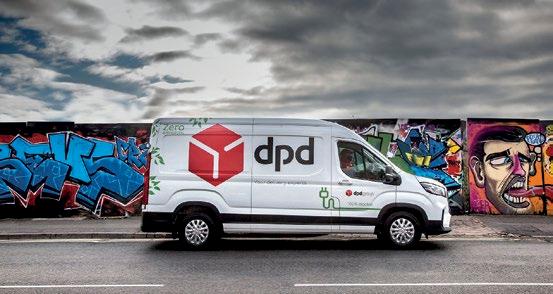
differentiate the way shoppers interact with and use its products.
Unilever is initially trialling the Be My Eyes technology in the UK through its Colman’s Singapore Noodles Meal Maker, with the intention of rolling it out across more brands in 2024.
Scanning the AQR code on the front of pack, shoppers can now be directed to the Be My Eyes app for free and connected to either a volunteer to read and describe cooking instructions or to a virtual AI chatbot which uses Chat GPT-4 capabilities to address recipe or cooking questions.
Sibstar
Sibstar, a debit card and app for people living with dementia that has appeared on the Dragons Den TV show, was unveiled as the winner of the FinTech’s Pitch Live 2024 competition, held at the Pay360 trade show in London during March.
Founder and CEO, Jayne Sibley, told attendees that she created Sibstar after her mum got dementia. “I built the app because of my lived experience,” she said, while detailing the problems her mother was encountering in remembering to take cash, use one card and not another, and
so on when she went shopping or outside.
The Retail Trust
Retail industry charity, the Retail Trust, has developed a generative AI powered dashboard to help retailers including FatFace and Next improve staff mental health and prove the value of their wellbeing strategies.
The new ‘happiness dashboard’, built in partnership with a handful of retail employers and the Retail Trust’s technology partner BJSS, allows companies to track staff wellbeing trends and improve the effectiveness of support.
The platform works by identifying trends around which Retail Trust wellbeing services employees are using to generate recommendations on how to improve engagement, reduce levels of absenteeism or presenteeism, and increase staff retention.
It also shows each employer exactly how much initiatives to improve mental health are saving their business and the economy, by calculating the financial value of fewer staff calling in sick, working while unwell, quitting their jobs or turning to the NHS as a result.
Payments
Flying Tiger Copenhagen
Flying Tiger Copenhagen has announced the deployment of MishiPay’s suite of transaction solutions across 56 UK stores. Since the end of September, the chain has been operating exclusively on MishiPay for all transactions.
Already a user of MishiPay’s Scan & Go solution, Flying Tiger Copenhagen has expanded its partnership to include cash desk and self-checkout kiosks. It has further plans to introduce the company’s mobile Point of Sale (mPOS) solution to its roster.
Everlane
Shopify’s ShopPay solution has made an appearance on a non-Shopify website, with some industry observers predicting the end of one-click checkout businesses.
Everlane’s website now has an express checkout that features the offering alongside Apple Pay and PayPal.
Retail media HyperFinity
Decision intelligence specialist, HyperFinity, has launched a new retail media product, designed to help retailers leverage their first-party data, and maximise the impact of advertising.
In pursuit of its net zero 2040 goal, DPD UK has launched the EcoLaunchpad programme.
This year’s report highlights several interesting uses of AI in the retail sector
Retail Tech Innovations Report
The UK-based company’s platform links together customer spend data, product attributes, and web browsing data to deliver precise insight into consumer behaviour and needs. These insights are used to target consumers with highly relevant products on retailers’ websites, apps and in-store.
Walmart
Walmart has announced a pilot project with unspun, a fashion tech company using 3D weaving tech.
Walmart has announced a pilot project with unspun, a fashion tech company using 3D weaving technology, a collaboration that, if successful, could help reduce the environmental impact of garment production, offer a more sustainable process for meeting apparel demand and support the companies’ commitment to shift more textile manufacturing back to the US.
Out of its micro factory in Oakland, California, unspun’s technology aims to more quickly and efficiently transform yarn into garments.
The pilot project addresses concerns about waste in the apparel industry driven primarily by fabric loss from traditional flat weaving, cutting and garment assembly, and from discarded extra inventory built to meet growing consumer demand and fashion trends. And not to forget the emissions generated from transporting garments and fabrics supplied offshore.

Rokt and Deliveroo
Rokt, an e-commerce technology company that uses machine learning and AI to serve relevant offers to shoppers, has announced a partnership with delivery giant Deliveroo on the order tracker page.
Deliveroo has been building its retail media network since launching its advertising platform in 2021.
As part of its newly developed advertising platform, it will now integrate with Rokt, which allows brands to capture the attention of customers directly on e-commerce confirmation pages.
This means that advertisers in the Rokt Ads network can now access Deliveroo’s audiences, and Deliveroo can provide the most relevant third-party offers to customers on their order confirmation page.
3D tech
J.Crew
J.Crew has launched a Virtual Closet app on Apple Vision Pro, the heavily hyped new spatial computer that blends digital content with the physical world and unlocks spatial experiences.
Created in partnership with Obsess, this allows users to shop J.Crew products in an interactive, ultra-high-definition 3D environment.
It utilises SharePlay, a set of features for shared experiences while on a FaceTime call, to chat with J.Crew’s stylists or host group calls to get others’ opinions on looks.
Joybird
Joybird, a unit of La-Z-Boy and furniture manufacturer and retailer, has announced the full integration of 3D Cloud by Marxent’s 3D Cloud Room Scanner technology into its online 3D Space Planner tool.
Joybird is the first furniture retailer to offer this integrated 3D floor plan creation experience to customers. The 3D Cloud Room Scanner technology enables customers to create a floorplan 10x faster than traditional measuring, recreating a room in three dimensions in just minutes. It leverages algorithms to precisely capture room dimensions, layouts, and existing furniture, allowing users to virtually design and arrange Joybird’s furniture pieces within their actual living spaces.
3D Room Scanner joins 3D Space Planner and Modular Sofa Builder. The latter tool provides real-time customisation to mix and match components to build a customised couch, loveseat, sectional sofa, or double-sided lounger.
New Balance
New Balance recently opened a concept store in Singapore, featuring a Volumental 3D foot scanner in the fitting area.
Since partnering with Volumental in 2017, the retailer says that it has scanned the feet of more than one million shoppers worldwide.
The scan, which takes less than five seconds, provides employees with detailed information about a customer’s feet, helping them find a shoe that’s sure to fit.







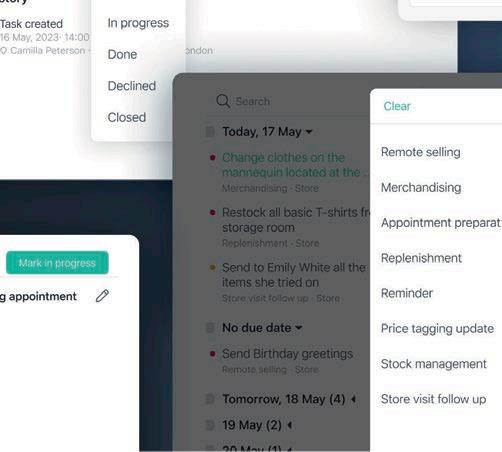



Interview

3d cloud by marxent’s
Beck Besecker Interview
Ahead of the launch of the second RTIH Retail Technology Innovations Report, we caught up with Beck Besecker, CEO and Co-founder, 3D Cloud by Marxent, to find out more about his views on retail innovation, developments at his company and why in the future 3D shopping is inevitable.
Beck
Besecker: “People love control, and they don’t want to feel sold to”
Room planning and product configuration used to be the domain of designers but as 3D tech evolves it’s shifting the power balance to consumers, and they are loving taking control, says Besecker.
“We are all the hero of our own story, and we all love our own ideas,” he comments. “People love control, and they don’t want to feel sold to. If you can give them tools where they feel like they are in control, such as designers doing a room but letting the consumer pick a paint or floor, that will help them close the deal.”
The 3D visualisation market is being fuelled both by product innovation in the retail sector and a greater willingness of consumers to embrace such tools. And it’s enabling 3D Cloud by Marxent to take a greater share of the market than ever.
Besecker says the market has also changed, with Covid playing a part in increased adoption of online tools more, as well as a whole new digital native generation moving into the homebuying phase and being more engaged with using such tech. In addition, financial pressures mean more people are investing in existing space rather than moving, which is also fuelling demand.
3D Cloud by Marxent wants to take advantage of all such growth. “Our focus is in and around the home category,” says Besecker. “We started in furniture but over the last few years, we’ve grown several new categories. So now we have traditional furniture and office furniture, kitchen, bath, outdoor and storage.”
Shopping in 3D is inevitable
Interview
But the company isn’t stopping there. “The plans in the coming months are to continue to expand with doors and windows, flooring and landscaping; the idea being that if you go to a DIY retailer site and go down the list of categories they service we are continuing to scroll down that list.”
As well as expanding the categories it serves 3D Cloud by Marxent is also expanding the applications it provides across the categories - from photo rendering and augmented reality to product configurators (such as designing the finishes for an office chair) and modular configurators (such as for modular sofas).
Ultimately Besecker states that what the company is trying to do with such solutions is to provide tools that support the initial phases of the buying journey and lead to what he describes as the “jewel in our crown” - the company’s room planning tool. The room planner allows users to create room designs in seconds, replacing a convoluted process that would take weeks of updates between client and supplier previously.
The functionality of the room planner is also continually evolving with new features to enhance the user experience, he says. These include the ability to create high-definition images, like lifestyle shots. Having added design automation users can now build their floor plan and then click a photo and the tool will automatically design the space based on the design aesthetic of that room photo.
The adoption of room scanning, meanwhile, allows users to scan their room, create a floor plan, browse photos and automatically build a space.
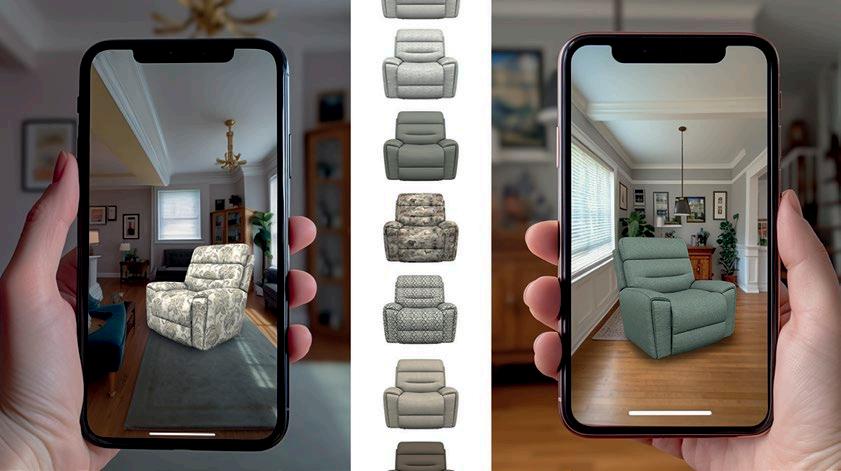 La-Z-Boy’s 3D Cloud WebAR experience allows shoppers to configure and view every possible recliner combination in their space.
La-Z-Boy’s 3D Cloud WebAR experience allows shoppers to configure and view every possible recliner combination in their space.
Interview
Room planning and product configuration used to be the domain of designers, but as 3D tech evolves it’s shifting the power balance to consumers, and they are loving taking control
“Our mission as a company is to make it faster and easier for consumers to personalise and configure whatever it is they want to do - whether it’s individual products, a group of products or an entire room.”
And it’s this improved capability that is shifting the power balance for users and what they can be in control of, he says. “If you look at these big ticket purchases such as kitchens and bathrooms they have all historically been the domain of professional designers. Our tools are aimed at supporting these professionals as well but we’re the guys putting it on a browser and moving it into the cloud, creating more visual, inspirational experiences, automating it and making it more fun.”
Traditionally the company has supplied big enterprise clients such as Lowe’s, La-Z-Boy, B&Q, and John Lewis, but Besecker says the next step is to release such tools directly to professional designers.
For individuals planning projects, however, the tools are invaluable to decision-making. “More and more consumers expect to be able to spend more time ideating, shopping and researching products online long before they ever come to the store or put something in a basket.”
Besecker explains that, as customers advance their own buying journey with each tool, dwell time and therefore engagement and propensity to buy increases.
For those using AR on a site, for example, he says the company’s stats show that a consumer will use it 5-7% of the time, spending about 90 seconds engaging and being three times more likely to put the item in question in their cart.
Those numbers increase when users engage with product configurators. Then engagement rises to 17 minutes spent on the design, an average of seven different configurations and an add-to-cart rate of 30%.
“It’s a deeply engaging experience.”
When it gets to the room planning tool Besecker notes that consumers will spend an average of 30 minutes planning a room and save six different iterations of the design. The average order value, meanwhile, increases by 40%.
“It’s all about inviting shoppers to start the buying journey on their own terms through a series of experiences that ultimately lead to room planning. The ability to work through their questions and
ideas before they get to the planning phase is priceless and it leads to a whole room purchase rather than the purchase of a single product.”
But the company has also realised the important role of more subtle tools, such as style visualiser quizzes or budget estimators. These can prove genuinely useful to the consumer but also start them on the sales journey without them even realising it.
“It just feels like extra help in something that can be quite overwhelming, so if you take them through the journey in this way, it makes sense to them. It doesn’t feel like you’re pushing them towards a bigger purchase, it just feels like something sensible to do.”
Asked about innovations in the wider market, Besecker, unsurprisingly, cites the power of AI, although he warns that it’s limited to the dataset you can bring to bear and the need to teach it effectively for it to do its job properly. However, he believes the potential is huge. At 3D Cloud by Marxent, he says the company’s automated design capability will continue to improve, with the design processes becoming faster as its system learns from the database of thousands of projects that the company holds.
Ultimately, however, he believes that 3D technology will change how consumers view and shop products forever. He shows off a live model of an office chair on the website Herman Miller.
“It’s not a picture. It’s a live model. Within the next five years, product photos will be competely replaced by 3D assets. Even 2D imagery will be rendered from 3D models. Whether it’s shampoo bottles, dog toys, purses or shoes, every visual asset will start with 3D. Shopping in 3D is inevitable.”
 Joybird, the US-based furniture retailer, is using 3D Cloud Room Scanner technology to speed up the room measuring process and get to the design phase more quickly.
Joybird, the US-based furniture retailer, is using 3D Cloud Room Scanner technology to speed up the room measuring process and get to the design phase more quickly.


RTIH’s Top 100 Influencers

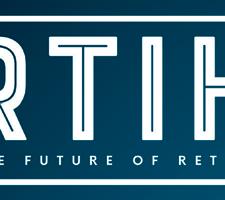


RTIH’s Top 100 Retail Technology Influencers List
The latest edition of the RTIH Top 100 Retail Technology Influencers List has arrived, sponsored by 3D Cloud by Marxent. Here are the people who made a splash in 2023 and are set for a barnstorming 2024.
RTIH has scoured the retail technology world to find the most influential figures for this comprehensive list of people and trends that shape the industry and help drive it forward.
We’re living in unprecedented times.
The Covid-19 outbreak and cost-ofliving crisis have driven a seismic change in shopping habits. We are seeing retailers taking innovative technologies like AR, AI, and spatial computing, and finding ways to use them to make customer experiences more exciting and dynamic.
Which is where the RTIH Top 100 Retail
Technology Influencers List comes in, presented, we should stress, in no particular order.
Such disruption requires new ways of problem solving and thought leaders who can both evangelise and execute on the likes of digital transformation and omnichannel success.
We hope you enjoy reading through it and, as always, if you would like to give feedback or believe that there are some glaring omissions, please feel free to get in touch (contact details can be found on page three of this magazine).
Scott Thompson, Editor and Founder, RTIH

RTIH’s Top 100 Influencers
CRISTINA RUTGERS-ASTOLFI
LinkedIn Bio Global Head of Analytics Ikea Customer Support | Digital Sustainable Transformation Leader | Customer Experience and Loyalty Expert | Speaker.
ELODIE PERTHUISOT
LinkedIn Bio CEO Carrefour España & EXCOM member at Carrefour.
PAULA BOBBETT
LinkedIn Bio Chief Digital Officer/Executive Director/ Non Executive Director.
ALICE RACKLEY
LinkedIn Bio CEO and Co-founder at Polytag Limited I Women in Innovation Winner UKRI 2023 I Grocer Gold Award Winner 2023 for “pioneering a new approach to recycling” I UK Packaging Award Winner 2023 | NRA Innovation 2023.
LEONID GLADILIN
LinkedIn Bio Let’s boost your LTV | B2C and B2B e-commerce | Customer-centric loyalty | Retention is a King.

Rackley
HARLEY FINKELSTEIN
Twitter/X Bio Entrepreneur // @Shopify President.
GIOVANNI ZACCARIELLO
LinkedIn Bio SVP Global Visual Experience at Coach.
BRYAN ROBERTS
Twitter/X Bio High quality tweets about shops, Haribo, mushrooms, burgers & football.
GARY NEWBURY
LinkedIn Bio Award winning Strategic Advisor & Delivery Executive | RAPID Transformation of Disrupted Supply Chain Performance | Industrial Strength | Field-Tested | RAPID Methodology | Contact me via RetailAID.ca.
SHISH SHRIDHAR
LinkedIn Bio Global Retail Startups Lead | RETHINK Retail Top 100 Retail Influencer 2022 | RTIH Top 100 Retail Technology Influencers | Advisory Board GMU Center for Retail Transformation.
TOM BETTS
LinkedIn Bio Group Data Director at Kingfisher plc (B&Q, Screwfix, Castorama, Brico Depot, Koçtas).
JASON GOLDBERG
Twitter/X Bio Chief Commerce Strategy Officer @ PublicisGroupe; Host of Jason & Scot E-commerce Podcast; Digital commerce, retail SME; @Forbes contributor (opinions=mine).
JONATHAN DE MELLO
Twitter/X Bio Retail & Retail Property expert. Founder & CEO of JDM Retail. NED. Top 25 Retail Influencer. Providing strategic consulting to retailers & property investors.
RTIH’s Top 100 Influencers
ANDREY GOLUB
Twitter/X Bio #Fashion & #Retail Strategist, #FashionTech & #RetailTech Expert.
NINA MIMICA
LinkedIn Bio Board Member and Chief Innovation Officer @ Studenac market // MBA in International Business.
PATRYK POWIERŻA
LinkedIn Bio Żabka Nano Growth | Autonomous Retail | Newsletter Author.
LIZA AMLANI
LinkedIn Bio Retail Consultant and Trusted Advisor | Merchandising | Product Creation | Sustainability | Corporate Retail Strategy | Speed to Market | Supply Chain | Board Member.
FRANK BEARD
Twitter/X Bio Retail tech marketer | Speaker and writer | Once spent a month eating at gas stations and lived to tell the tale.
MICHAEL GABAY
LinkedIn Bio Co-Founder and CEO at Trigo.
KATHARINE MCKEE
LinkedIn Bio Fortune 500 E-commerce Strategist l Startup Advisor l Digital Commerce Expert l Increasing Margins and Growth l Founder of Morphology Consulting® l Forbes Next 1000.
MICHAEL LEBLANC
LinkedIn Bio Founder | Strategic Advisor | Keynote Speaker | Podcaster | Top Global Retail Influencer | YouTube BBQ Show Producer & Host.

RTIH’s Top 100 Influencers
DEANN CAMPBELL
LinkedIn Bio Retail strategy & CX expert | Top Retail Influencer | Speaker | RetailWire BrainTrust | RETHINK Retail Advisory Council | I help companies elevate customer experiences and profit margins.
STACEY WIDLITZ
LinkedIn Bio Chief Int. Store Hunter SW Retail Advisors, Co-Founder @thedealmakehers. Duchess of Retail, NED, Angel Investor, Biz TV reg, fmr sell-side, Perma jet lag, forbes.
MICHELLE GRANT
Twitter/X Bio Exploring the impact of digital transformation in retail and consumer goods. @ Salesforce. Former Head of Retailing @Euromonitor. All opinions are my own.
MARSHALL KAY
LinkedIn Bio Strategic Advisor to retailers, global brands, investors and others connected to Retail. Speaker. Writer on Retail topics for Forbes. One of 2022’s most influential Thought Leaders (as awarded by RETHINK Retail).
STEVE DENNIS
Twitter/X Bio Strategy consultant. Keynote speaker. Top #retail influencer. Best-selling author of “Remarkable Retail: How to Win & Keep Customers in the Age of Disruption.”
BRENDAN WITCHER
Twitter/X Bio @Forrester Vice President / Principal Analyst for Digital Business Strategy, Customer Engagement, eCommerce, Personalization, Omnichannel, Retail, Mobile, & AI.
OLIVER GUY
LinkedIn Bio Empowering industry leaders to innovate & compete with greater agility. | Microsoft Retail.
JEFF ROSTER
Twitter/X Bio Cohost #ThisWeekInInnovation & #ThirdEyePodcastNetwork.ThirdEye Advisor-Retail, RETHINK Retail Top 100 Retail Influencer, Orphan advocate #AI #lowcode #IoT.

ANDREW BUSBY
Twitter/X Bio Founder @RetailReflect | Best-Selling Author | International Keynote Speaker | Former @Forbes | RTIH & RETHINK Retail top influencer | Views my own.
SCOTT THOMPSON
Twitter/X Bio Founder and Editor @RTIH_RetailTech #retailtech #retailtechnology #retail #retailsystems #payments #onlineshopping #ecommerce.
VIV CRASKE
LinkedIn Bio Advisor for retail/FoodTech/online grocery scale ups | Author.
MATTHEW TAYLOR
LinkedIn Bio Partner at EY | CIO | Seasoned Global IT Delivery, Transformation and Operations Leader | FBCS | CITP | CISSP | CCSP | RTIH Top 100.
STEVE COLLINGE
LinkedIn Bio LinkedIn Influencer, International Speaker and Expert on the Home & Garden Industry. Group Managing Director @ QEP UK Limited | Sales & Marketing Director.
YAEL KOCHMAN
LinkedIn Bio Retail Disruptor | TheMarker 40/40.
RTIH’s Top 100 Influencers

PAUL DO FORNO
Twitter/X Bio Managing Director / Eminence Lead Commerce Practice @DeloitteDigital. B2B B2C Commerce DigitalTransformation Expert. Alum: @uofwaterloo.
RON THURSTON
LinkedIn Bio Best Selling Author of RETAIL PRIDE, Host of the RETAIL IN AMERICA Podcast, ReTHINK Retail 100 Most Influential People, Live Full Time in an Airstream.
BECK BESECKER
LinkedIn Bio Founder & CEO, 3D Cloud by Marxent.
DAVID POLINCHOCK
LinkedIn Bio Helping retailers and brands understand the emerging tech impacting the physical space, including AR & the metaverse. 30 years’ experience in VR.
TIFFANY LUNG
Twitter/X Bio I write about retail, tech and innovation at @ Forbes, @TatlerAsia, @InRetailAsia, @JingDaily | @RETHINK_ Retail Top Retail Influencer | Web3 & NFT enthusiast.
MATT BRADLEY
LinkedIn Bio Director & Founder - Retail Technology Show.
MIKE CADDEN
LinkedIn Bio Transformational retail focused IT Director/CIO/Programme Manager; RTIH Top 100 Retail Tech influencer.
CATHERINE SHUTTLEWORTH
Twitter/X Bio ceo and founder of savvy marketing, retail commentator permanently curious and always on look out for great ideas
RTIH’s Top 100 Influencers
MARTIN NEWMAN
Twitter/X Bio The Consumer Champion. Founder http:// CustomerServiceAction.com Agent: http://KnightAyton. co.uk New book out now: http://bit.ly/PowerofCX
GREG DEACON
Twitter/X Bio VP Groups & Business Development @ SnappyShopperUK | Retail Solutions | Retail Media | Brand Builder | Delivery | Tech | LFC.
MEGAN LUDLOW
LinkedIn Bio RTIH Top 100 Retail Tech Influencer | On the search for innovative businesses to help turbocharge M&S’s digital transformation.
TREVOR SUMNER
Twitter/X Bio Head of AI @tryraydiant, reinventing #retail, founder of LocalVox, tech exec, #NYC native, amateur chef & global #scuba diver. Contributor for @Inc and @Forbes.
CAS PATON
LinkedIn Bio Founder and CEO of OnBuy.com - Where loyalty is rewarded.
BRITTAIN LADD
Twitter/X Bio Global supply chain management, micro-fulfilment, and strategy. #retail #supplychain.

SARAH HOFSTETTER
LinkedIn Bio President at Profitero, Campbell Soup Board Member, 25+ year digital, marketing & tech entrepreneur.
JENNIFER STEPHENS
LinkedIn Bio Chief Marketing & Digital Officer / NED - Innovation / Ecommerce / Retail / Consumer / Top 100 Fashion Tech. Web3 - CPG Mentor | Blox Mentor | FWB Member | Real Vision Member - JROE.ETH.
MICHELLE KEARNS
Twitter/X Bio Digital Leader @BootsUk Ireland | @ OHT_Ireland. Founder | #CIO #Health #Retail #TechAtBoots #DEIinTech | Loving life #Dancing #Rugby #Shenanigans she/her.
CONOR ROSE
LinkedIn Bio Principal Strategist at Marks and Spencer.
ANDY BALDAUF
Twitter/X Bio Top 100 Retail Tech Influencer | Done is better than perfect |Master #DigitalBusiness @fhhwz #digital #retail #ecommerce #marketing #innovation.
TONY D’ONOFRIO
Twitter/X Bio Top 100 Retail Influencer, CEO / CCO, Private Equity Board Advisor, 8800+Contacts / 160,000+ Linked-In Followers, Consulting, Motivational Speaker. Views my own.
RICHARD HAMMOND
Twitter/X Bio Author of Friction/Reward and Smart Retail; sold globally in 22 languages. Created the friction versus reward metric (FvR), loves retail and customers.
SUCHARITA KODALI
Twitter/X Bio Retail analyst @Forrester, a technology research firm. Comments and views are my own.
RTIH’s Top 100 Influencers
CHRISTINE RUSSO
LinkedIn Bio Leading Industry Voice. Host of Inviteonly Executive Interviews on the What Just Happened Podcast produced by Marketscale. Moderator, Advisory Board Member and Contracted For My Unique and Winning B2B Growth Techniques.
STEVE LISTER
LinkedIn Bio Sustainability Director - Global Brands & Retailers at HH Global RETHINK Retail - Top Retail Influencer 2023 - Retail Expert.

NEIL SAUNDERS
Twitter/X Bio Managing Director of GlobalData Retail, founder of Conlumino. I analyse all sorts of things to do with retail, shopping, and consumers.
NIKKI BAIRD
LinkedIn Bio Vice President of Strategy at Aptos Retail.
NEIRA JONES
Twitter/X Bio Advisor| Speaker| Payments| Innovation| Fintech| Regtech| Security | Cyber | I make it happen... http://neirajones.thinkifi c.com http:// instagram.com/neiraj0nes.
PAULA ROSENBLUM
Twitter/X Bio Technology-driven customer-centric retail is my passion.
MAUREEN HINTON
Twitter/X Bio Retail analyst - UK, global, all views expressed are my own.
NATALIE BERG
LinkedIn Bio Retail Analyst / Author / Podcast Host #RetailDisrupted.
TOBY PICKARD
Twitter/X Bio Innovations, trends, futures insight provider | Speaker | Solutions that enhance retailing. #StoreoftheFuture #FutureofRetail #DigitalDisruption.
JO HICKSON
LinkedIn Bio Head of Innovation Lab, Tesco Technology, Group Innovation.
GLENN FAULKNER
Twitter/X Bio Proud father of 4, adopted Yorkshire man Technical Program Manager at AiFi. Views expressed are my own
RTIH’s Top 100 Influencers
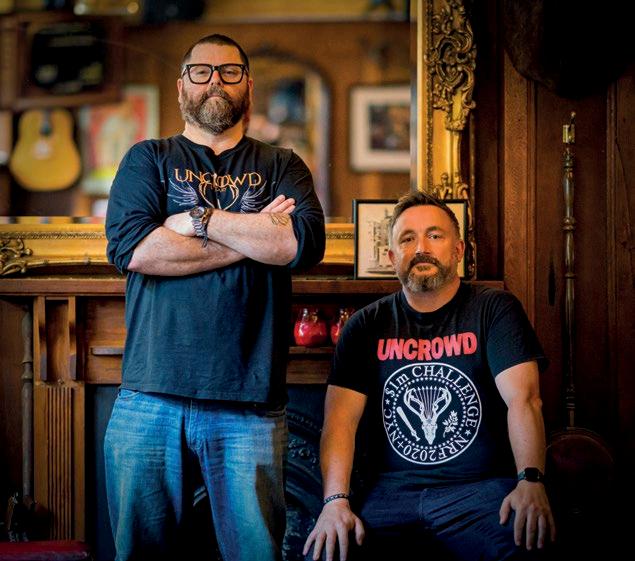
KATE HARDCASTLE
LinkedIn Bio The Leading Consumer Engagement Specialist - Advisor, Broadcaster, Speaker - UK, USA, UAE.
DEBORAH WEINSWIG
LinkedIn Bio CEO & Founder at Coresight Research | Thought Leader and Keynote Speaker in Metaverse, China, Retail, Livestream and Retail Tech | Board Member.
PAUL WILKINSON
Twitter/X Bio Product Manager, Groceries at Deliveroo - formerly at Alexa Shopping and “an unlikely Tesco employee” according to Wired. Own opinions.
STEVE DRESSER
Twitter/X Bio Insight and advisory for retail execs worldwide. “The man supermarket CEO’s turn to (BBC) “Let’s make retail great again”, #10. SEN Tribunal vet.
REBEKAH KONDRAT
Twitter/X Bio Founder, rekon Retail™ | Former @Apple, @
WarbyParker, @OutdoorVoices, Joybird | Founder at rekon Retail | Ballerina | Retail is Alive™ rebekah@rekonretail.com.
CELIA VAN WICKEL
LinkedIn Bio eCommerce | Retail | CPG | Analytics Thought Leader | Thoughts Expressed Are My Own.
EVA PASCOE
Twitter/X Bio Pioneer of Cybercafe Cyberia, ex-Topshop e-commerce, @ShopifyPlus, Cybersalon, retailtech, Future High Street, GrimseyReview 2.0.
NADINE NEATROUR
LinkedIn Bio Director of Marketing, Selfridges. Customer Centric Leader. Helping brands see through a customer lens to drive sustainable growth. Advisory. Consulting. NED.
BOB PHIBBS
Twitter/X Bio Bob Phibbs, the Retail Doctor. Professional speaker on retail sales, training and marketing. Author, blogger, business makeover specialist, retail influencer.
MIYA KNIGHTS
LinkedIn Bio Magazine publisher, author, speaker.
GEOFFREY BARRACLOUGH
Twitter/X Bio Business of Payments. New blog looking at how Paytech makes money. Sign up for the newsletter.
OLIVER BANKS
Twitter/X Bio Helping retailers transform operating models. Coach & consultant. Podcast host of the Retail Transformation Show.
GRAHAM SOULT
Twitter/X Bio #Retail consultant at @CannyInsights, @ HighStreetsTF Expert, @PlaceManagement Fellow, and @Durham_Business vice-chair. BBC: “The NE’s bestknown retail expert”
RTIH’s Top 100 Influencers
GREGG LONDON
LinkedIn Bio U.P.C. Database / Supply Chain Consultant - Grocery Pragmatist.
ALEX BAKER
LinkedIn Bio 100 Top Retail Influencer 2023 | Senior Advisor | Speaker | Angel Investor | Impact Entrepreneur.
SIMEON SIEGEL
LinkedIn Bio Managing Director, Senior Analyst, Board Member.
IAN SHEPHERD
LinkedIn Bio Chairman, Bensons for Beds, and regular writer on retail & consumer topics.
RICHARD LIM
LinkedIn Bio Chief Executive at Retail Economics.
OSKAR JAKOBSSON
LinkedIn Bio Chief Product Officer (CPO), Retail influencer, speaker and Innovator. Board member and senior advisor.

IAN SCOTT
LinkedIn Bio Understanding the shifting retail landscape, delivering actionable solutions with global shopper marketing insights and a customer centric perspective.
KRZYSZTOF HEYDA
LinkedIn Bio Omnichannel Development Manager | Product Manager | Retail Technologist | Vintage Tech Lover | ex-żappka.
JEFF ROSTER
Twitter/X Bio Cohost #ThisWeekInInnovation & #ThirdEyePodcastNetwork.ThirdEye Advisor-Retail, RETHINK Retail Top 100 Retail Influencer, Orphan advocate #AI #lowcode #IoT.
HARMONY MURPHY
LinkedIn Bio Senior Advertising Head @ Google | ex eBay GM, ex Telegraph Global Head, Advisory Board Member, Certified Coach.
KATIE ROLFE
LinkedIn Bio Head of Customer Experience at InPost UK.
NAOMI SIMCOCK
LinkedIn Bio Operations Director, John Lewis Partnership.
CAROLE KINGSBURY
LinkedIn Bio CIO | Technology Director | Peoplefocussed Change and Digital Transformation Leader.
SUSANNAH JAFFER
LinkedIn Bio Founder of ZERRIN | Sustainable Fashion, Media & Retail | Singapore/London | Linkedin Top Voices Green.
RICK WATSON
LinkedIn Bio eCommerce Strategy Consultant | Strategic eCommerce Consulting to Optimize Your Results | ECommerce SaaS Positioning and Go-to-Market Strategy | Organizational Change Management | E-Commerce Expert Witness. Harmony Murphy
RTIH’s Top 100 Influencers
ART SEBASTIAN
LinkedIn Bio Entrepreneur I Retail Influencer I Omni-Channel Marketing I Digital Transformation I Retail Media Networks I Go-to-Market Strategy.
RICHARD WALKER
Twitter/X Bio Executive Chair @IcelandFoods @ BywaterProp @IcelandCharity. Ambassador @ AlzResearchUK @WildlifeTrusts. Vice President @ FaunaFloraInt. Insta: richardiceland
JOHN-PIERRE KAMEL
LinkedIn Bio Retail, Omni-Channel, Mobility and Technology Executive | Rethink Retail Top Retail Expert 2024.
CHRIS IGWE
LinkedIn Bio Global Retail Strategy Advisor & Founder at CHRIS IGWE INTERNATIONAL | Retail Real Estate authority | MD Karine Augis | Top Retail Expert | Keynote Speaker | Author.
HOW DO WE IDENTIFY THE TOP 100?
We use a variety of sources to select our top 100, including feedback from industry observers, research within our own networks, direct or third-party nominations via our website, and social media tools.
In addition to social presence, we also take into account award winners and judges, event speakers, books published, media appearances, and people building innovative companies, solutions etc in the retail space.

SATO UK

SATO UK
Leading the way in Auto-ID solutions
Since its inception in 1940 and its expansion into the UK market in 1996, SATO has firmly established itself as a foundational pillar in the Auto-ID solutions industry.
Rooted in core values of customer centricity, innovation, integrity, teamwork, open communication and mutual success, SATO aspires to be the most trusted name globally within
the Auto-ID landscape. This ambition is driven by a mission to continuously deliver superior products and services, thereby creating unparalleled value for its customers and contributing towards a more sustainable and efficient future.
SATO’s rich legacy of innovation is marked by significant milestones, such as the launch of the world’s first-hand labeller in 1962 and the introduction of Japan’s first RFID printer in 2003. These advancements reflect
The SATO team at Retail Technology Expo 2023.


SATO’s continuous dedication to pioneering with advanced technology, meeting the dynamic needs of the market while establishing benchmarks for the industry.
Beyond these innovations, SATO’s global footprint and its ability to adapt solutions across a diverse range of industries underscore its comprehensive approach to solving complex challenges. Whether streamlining supply chains, enhancing retail experiences, or advancing healthcare and manufacturing processes, SATO’s technologies play a crucial role in driving efficiency and productivity worldwide. In this era of accelerated digital transformation, SATO is at the vanguard, continually expanding the realm of possibility within the Auto-ID
SATO’s rich legacy includes the launch of the world’s firsthand labeller in 1962 and the introduction of Japan’s first RFID printer in 2003
solutions domain. This ensures that businesses are wellequipped with the necessary tools to thrive in a world that is ever more connected and reliant on sophisticated data analysis.
Innovative solutions for Retail Technology Show 2024
SATO’s state-of-the-art RFID technology revolutionises inventory management for businesses, offering real-time tracking to mitigate the risk of lost items and enhance efficiency.
With a comprehensive range of RFID tags and printers, tailored to client-specific needs, SATO ensures optimal solution selection and seamless technology implementation. Experience these innovations at Retail Technology Show with the SATO-D2 Claw machine, demonstrating the practical application of RFID in marking down prices and printing shipping labels, showcasing the seamless integration and dynamic updates possible with SATO’s solutions.
Their offerings also include
SATO UK


custom-printed labels from their Harwich factory, designed to meet the specific needs of clients, ensuring optimum performance and consistency. The company is dedicated to helping businesses meet their Sustainable Development Goals (SDGs). One key sustainability option SATO offers is linerless labels, which eliminate the backing material used in traditional labels. This innovative solution significantly reduces waste, allows for more labels per roll, and ultimately minimises storage, packaging, and transportation emissions.
In addition to RFID labelling solutions, SATO specialises in price markdown labels and shelf edge labelling, addressing the retail sector’s demand for efficient, eye-catching and accurate pricing and product information solutions. These solutions are particularly noted for their adaptability in fastpaced retail environments, ensuring products are accurately labelled and priced, enhancing the shopping experience and operational efficiency.
SATO UK
Beyond retail: SATO’s solutions for food safety and efficiency
SATO’s commitment to excellence extends to the food industry, offering comprehensive solutions designed to ensure compliance with the most stringent food safety regulations. Their labelling systems are meticulously developed to support businesses in adhering to legislative requirements, thus safeguarding consumer health while enhancing the traceability and authenticity of food products. This dual focus on compliance and operational efficiency is pivotal in maintaining high standards of food safety across the supply chain, from production to point of sale.
Further expanding their contribution to the food industry’s efficiency, SATO leverages their FX3-LX intelligent printer alongside the Delivery Cloud system, transforming how takeaway and delivery services manage their operations. This innovative pairing serves as a central hub, consolidating orders from various platforms into a single, manageable dashboard.
The FX3-LX printer excels in producing clear, durable
labels, essential for accurate order fulfilment and inventory management. This solution significantly reduces food waste and increases the profitability of food service businesses. It streamlines kitchen operations, turning chaotic order environments into orchestrated activities of precision and efficiency, thereby transforming kitchens into models of operational excellence.
Engaging with SATO at Retail Technology Show
SATO invites attendees to visit Stand 6A20, where the convergence of innovation and practical application becomes evident.
This immersive experience is designed to not only showcase SATO’s cutting-edge Auto-ID and RFID solutions, but also to facilitate direct engagement with businesses eager to revolutionise their operations. Visitors will have the unique opportunity to witness the real-time benefits of SATO’s technologies, from enhancing operational efficiency to bolstering sustainability across various sectors.
Another highlight of SATO’s exhibition is the Bakery Management Solution, an intelligent system crafted to predict demand accurately, ensuring the production of the ideal quantity of bakery goods. This foresight is crucial in maximising profi tability while minimising waste, showcasing SATO’s dedication to creating solutions that respond to the nuanced needs of today’s industries.
SATO’s presence at Retail Technology Show is an invitation to explore how the latest innovations in Auto-ID solutions and RFID technology can be seamlessly integrated into business operations.
Attendees are encouraged to delve into discussions about potential partnerships, unlocking new avenues for growth and staying competitive in an everevolving marketplace. Through this participation, SATO reaffirms its commitment to advancing industry standards, offering a glimpse into the future of operational efficiency and sustainability.
Visit SATO at Retail Technology Show 2024 on stand: 6A20.

SATO’s commitment to excellence extends to the food industry, offering comprehensive solutions designed to ensure compliance with the most stringent food safety regulations










SATO’s state-of-theart RFID technology revolutionises inventory management for businesses.
SATO aspires to be the most trusted name globally within the Auto-ID landscape.













The awards celebrate global tech innovation in a fast moving omnichannel world, with winners being announced during a glittering ceremony at RIBA’s 66 Portland Place HQ in Central London on Thursday, 21st November.
This year, we’re bringing you three new categories: AI Innovation, Sustainable Retail Innovation, and Inclusive Technology Innovation.
AI Innovation
After a barrage of hype, the retail space is now seeing many examples of artificial intelligence creating value and efficiency.
This award will highlight AI projects across the omnichannel retail landscape that have gone beyond the proof-of-concept stage, scaling and delivering results.
Sustainable Retail Innovation
Traditionally, the biggest problem with sustainable technology solutions has been in the relatively high cost of implementation, often meaning that scaling them was not viable.
Things change, however, with incentives, targets and climate pledges as well as the rapid iteration of innovative
technologies driving down costs in various areas.
This award will go to a retailer or brand that has worked with technology suppliers to put sustainability at the core of its values. The winning entry will show how a company has boosted its green credentials whilst also demonstrating the tangible business benefits of sustainable practices.
Inclusive Technology Innovation
For 2024, we’ve decided to carve out a separate category to showcase what is being delivered in the inclusive shopping space, and shine a light on what is a huge, untapped retail customer/service market that suppliers and retailers are now really leaning in to and embracing more fully.
This award will go to a retailer or brand that has tapped innovative technology to put inclusion at the core of its values. The winning entry will show how a company has boosted its inclusive credentials whilst also demonstrating the tangible business benefits involved.
KEY DATES
Friday, 25th October: Award entry deadline Tuesday, 29th October: 2024 shortlist revealed 30th October-6th November: Judging days Thursday, 21st November: Winners announced at the 2024 RTIH Innovation Awards ceremony, to be held at RIBA’s 66 Portland Place HQ.
further information visit

tintist, sunditium.
shoptalk 2024 and the art of standing still
Our US correspondent, Christine Russo, reports from a busy, noisy, and hugely enjoyable Shoptalk 2024 in Las Vegas.
Do not let the title fool you. Shoptalk is a madhouse particularly if you are running late to your meet-up. Your lanyard swings while you either speed walk or slightly jog with eyes on that countdown clock. Being late is a major no-no and being a no-show, well that’s the kiss of death. Oh, and the new feature this year was loud overhead announcements: One Minute Remaiiiiininggggg. The stress!
So you run from table to table and guess what...it’s totally amazing.
The meetups were again the star of a show filled with many stars and starlets. Stars such as incredible booths, activations, keynotes and panels. And a new starlet called ShoptalkTV.
In a way, one could argue that Shoptalk competes against itself. In fact, there were stretches of time when the show floor felt lightly trafficked. Attendees were diverted to the talks and meetups. But, as Shoptalk does, it found its groove and the show floor started pumping with incredible energy. It reminds one that this is Las Vegas, after all, and early mornings are not really the thing.
One of the major takeaways was the much bigger presence of retail media. While not prevalent in the booths, they were E-V- E-R-Y-W-H-E-R-E – in the meetups, hosting parties with large teams and on stage. Does this mean the show is going more Martech oriented, maybe? Feels like it.
Another take away, especially for anyone who runs events or has booths, is that free stuff is still popular. This year, the
branded Shoptalk giveaways took place in the Swag Shop, cobranded by DoorDash, and it was incredibly popular with a line of 70 people when I counted.
Narvar managed to, once again, create a line of 40 people for their personalised Lulu lemon water bottles – no trend missed: check, check, check. I heard one vendor say, I would give my team all the totes and water bottles they could ever want just so they wouldn’t stand on the line to get into the swag shop. I disagreed and made my case that standing still, is actually not as wasteful as it may seem.
If you are standing still, the flow of people that will pass you, could (and usually does because of Shoptalk magic) include that one person you were looking for or hoping to meet. The art (and act) of standing still, at Shoptalk, is very powerful.
ShoptalkTV, while off to a slow start, has a lot of potential. There was a studio set up with live audience chairs and it felt different, more fluid and approachable than the stages. The content is just as good.
Lastly, the other starlet, off prem, is the Shoptalk equivalent of The Four Seasons in the Seagram Building Power Lunch from the 1980s – where everyone went, who you were with mattered, and the networking was unmatched.
The Seabreeze Restaurant with its Bahamian boat house, fake conch shells and pastel palette set in a desert is the place to be. You can count on seeing executives and colleagues in a casual setting. So, when you are working the room next year, remember who sent you.

retailers must tread cautiously as they embrace AI
Retail continues to suffer major headwinds, the competition to gain, indeed even keep, customers is more fierce than ever before.
Customers wallets are under severe pressure and price is now at the forefront of most buying decisions. Therefore, retailers are looking again at their digital transformation efforts to reduce cost, inefficiencies and improve customer engagement. Fortunately, over the last 18 months we have seen significant new tools to support these efforts in the shape of the rise of AI and LLMs.
At the forefront of this transformation are AI powered systems equipped with advanced natural language processing (NLP) capabilities. These systems can automate a wide range of administrative tasks, from data entry to document processing, with unprecedented speed and accuracy. By understanding and interpreting human language, AI automates repetitive tasks, reducing the risk of errors and increasing operational efficiency.
Back office administrative tasks often consume valuable time and resources. From processing invoices to managing schedules, these tasks are essential but can be mundane and time-consuming. However, the integration of AI is poised to revolutionise back office
admin functions, streamlining operations and freeing up resources for more strategic endeavours.
Take, for example, invoice processing - an essential but often labour intensive task in retail operations.
AI powered systems can scan and extract relevant information from invoices automatically, eliminating the need for manual data entry. This not only speeds up the process but also minimises errors, ensuring accuracy in financial records and compliance with regulations.
Whilst OCR has promised this for, well, decades, traditional OCR invoice matching systems have been somewhat hit or miss.
Similarly, AI can streamline employee scheduling, a task that traditionally requires significant time and effort from managers. By analysing historical data, employee preferences, and business requirements, AI powered scheduling systems can generate optimised schedules automatically. This not only saves time for managers but also ensures adequate staffing levels to meet customer demand, ultimately improving employee satisfaction and productivity.
Over the last 18 months we have seen significant new tools to support retailers in the shape of the rise of AI and LLMs.
Moreover, AI can enhance communication and collaboration within retail organisations. Chatbots powered by AI can handle routine inquiries from employees, such as HR related queries or IT support requests, freeing up human resources for more complex tasks. AI driven virtual assistants can facilitate seamless communication between different departments, ensuring that information flows efficiently throughout the organisation.
Retailers generate vast amounts of data, from sales transactions to customer interactions, which can be overwhelming to manage manually. AI powered data management systems can organise and analyse this data, uncovering valuable insights that drive informed decision-making.
For instance, AI can analyse sales data to identify trends and patterns, helping retailers anticipate customer preferences and adjust their inventory accordingly. By predicting demand more accurately, retailers can optimise inventory levels, reduce carrying costs, and minimise the risk of stockouts or overstocking.
Furthermore, AI can enhance compliance and risk management in retail operations. By analysing vast amounts of data, AI powered systems can identify potential risks, such as fraud or regulatory noncompliance, before they escalate into larger issues. This proactive approach allows retailers to mitigate risks effectively, protecting their reputation and bottom line.
One thing every retailer understands, but often struggle to implement, is that understanding customers is essential for success. With AI, retailers have gained powerful tools to transform customer analytics, marketing, and personalisation.
By harnessing the capabilities of AI, retailers can unlock valuable insights, create targeted marketing campaigns, and deliver personalised experiences that resonate with customers on a deeper level. The MarTech industry was an early adopter of machine learning and is accelerating this move into more sophisticated AI systems.
AI driven analytics revolutionise how retailers understand and segment their customer base. Traditional methods of analysing customer data often struggle to keep pace with the volume, variety, and velocity of data generated in today’s digital world. AI powered analytics solutions, however, excel in processing vast amounts of data in real-time, uncovering hidden patterns and insights that drive strategic decision-making.
By leveraging AI, retailers can gain a holistic view of their customers’ behaviours, preferences, and
AI in retail
AI can streamline employee scheduling, a task that traditionally requires significant time and effort from managers
interactions across multiple channels. These insights enable retailers to segment their customer base more effectively, identifying distinct customer personas and tailoring their marketing efforts accordingly. For example, AI can identify high value customers, predict churn risks, and recommend personalised offers or promotions to drive engagement and loyalty.
Moreover, AI enhances predictive analytics capabilities, enabling retailers to forecast future trends and anticipate customer needs with greater accuracy. Through historical data and external factors such as market trends and economic indicators, AI powered predictive analytics models can generate actionable insights that inform strategic planning and decision-making.
AI is revolutionising marketing in the retail industry, enabling retailers to create more targeted, personalised,
 The author of this article, Mike Cadden.
The author of this article, Mike Cadden.
AI in retail
and effective marketing campaigns.
Traditional marketing approaches often rely on demographic or psychographic segmentation, which may not capture the nuances of individual customer preferences and behaviours. AI powered marketing solutions, however, leverage advanced algorithms and machine learning techniques to analyse vast amounts of customer data and deliver hyper-personalised experiences.
One of the key advantages of AI in marketing is its ability to automate and optimise campaign management processes. AI powered marketing platforms can segment customers based on their preferences, behaviours, and purchase history, allowing retailers to deliver tailored messages and offers to each segment. Moreover, AI enables dynamic content optimisation, ensuring that marketing messages resonate with each individual customer in real-time.
Furthermore, AI enhances the effectiveness of marketing campaigns by enabling retailers to leverage predictive analytics to anticipate customer behaviour and preferences. By analysing historical data and identifying patterns, AI powered marketing platforms can predict which customers are most likely to respond to a particular offer or promotion, allowing retailers to allocate marketing resources more effectively and maximise ROI.
Personalisation is the cornerstone of modern retail, and AI is driving unprecedented levels of personalisation across all touchpoints of the customer journey. This enables retailers to deliver tailored product recommendations, content, and experiences that resonate with each individual customer, driving
engagement, loyalty, and ultimately, sales.
One of the key advantages of AI in personalisation is its ability to analyse vast amounts of customer data in real-time and deliver personalised recommendations at scale. AI powered recommendation engines leverage advanced algorithms and machine learning techniques to analyse customer preferences, behaviours, and interactions, delivering relevant product recommendations to each individual customer based on their unique preferences and context.
Moreover, AI enables retailers to deliver personalised experiences across multiple channels, including e-commerce websites, mobile apps, email, and social media. By leveraging AI powered personalisation, retailers can deliver consistent and cohesive experiences across all touchpoints, driving engagement and loyalty throughout the customer journey.
AI holds immense promise for transforming customer analytics, marketing, and personalisation in the retail industry. By harnessing the capabilities of AI, retailers can unlock valuable insights, create targeted marketing campaigns, and deliver personalised experiences that resonate with customers on a deeper level. As AI technology continues to evolve, its transformative impact on customer analytics, marketing, and personalisation in retail is only set to grow.
While the integration of AI into customer analytics and personalisation offers numerous benefits for retailers, it also raises significant ethical and moral considerations that cannot be ignored. As retailers leverage AI to gain deeper insights into customer behaviours and

One thing every retailer understands, but often struggles to implement, is that understanding customers is essential for success.
By leveraging AI, retailers can gain a holistic view of their customers’ behaviours, preferences, and interactions across multiple channels
preferences, it’s crucial to tread cautiously and consider the potential ethical implications of these technologies.
One of the most pressing ethical considerations surrounding AI powered customer analytics and personalisation is privacy. As retailers collect vast amounts of customer data to fuel AI algorithms, there is a risk of infringing upon individuals’ privacy rights.
Customers may feel uneasy knowing that their every click, purchase, and interaction is being analysed and used to target them with personalised marketing messages. Retailers must be transparent about their data collection practices and obtain explicit consent from customers before using their personal data for AI driven analytics and personalisation.
AI algorithms are only as good as the data they’re trained on, and there is a risk of bias creeping into the data and subsequently, the algorithms themselves. If AI algorithms are trained on biased or incomplete data, they may produce biased or discriminatory outcomes, potentially perpetuating existing inequalities and biases in society.
For example, an AI powered recommendation engine may inadvertently recommend products or services based on gender, race, or other sensitive attributes, leading to discriminatory outcomes. Retailers must proactively address data bias by carefully curating training data, regularly auditing AI algorithms for bias, and implementing mechanisms to mitigate bias in their AI driven analytics and personalisation efforts.
AI powered personalisation enables retailers to deliver highly targeted and persuasive marketing messages to individual customers. While personalised marketing can enhance customer engagement and loyalty when used responsibly, there is a fine line between personalised marketing and manipulative marketing practices.
Retailers must be mindful of the ethical implications of using AI to manipulate customer behaviours or exploit vulnerabilities. For example, using AI to analyse customer data and target vulnerable individuals with deceptive marketing tactics could undermine trust and integrity in the retail industry. Retailers must prioritise transparency, honesty, and respect for customer autonomy when leveraging AI for personalised marketing.
Finally, there is a growing demand for algorithmic accountability and transparency in the use of AI for customer analytics and personalisation. Customers have a right to know how AI algorithms are being used to analyse their data and make decisions that affect them.
Retailers must be transparent about the algorithms they use, how they work, and the potential implications for customers. Additionally, retailers should provide mechanisms for customers to access and control their
AI in retail
personal data, including the ability to opt out of AI driven analytics and personalisation if desired.
While AI offers tremendous potential to revolutionise customer analytics and personalisation in retail, it also raises significant ethical and moral considerations. Retailers must navigate these ethical complexities with care, prioritising privacy, data bias mitigation, transparency, and respect for customer autonomy. By addressing these ethical considerations thoughtfully and responsibly, retailers can harness the power of AI to enhance customer experiences while upholding ethical standards and values.
In today’s hyper-competitive retail environment, the omnipresence of AI offers undeniable benefits, from optimising operations to enhancing customer experiences. However, amidst the allure of efficiency and personalisation, it’s essential to acknowledge the potential downsides. As retailers embrace AI, they must tread cautiously, mindful of ethical considerations surrounding privacy and bias.
While AI holds promise, it’s crucial not to lose sight of the human touch in retail. As we marvel at the wonders of this brave new world, let’s not forget that true connection with customers cannot be solely algorithm driven. It’s a delicate balance between innovation and authenticity that retailers must navigate in this AI driven era.
About the author:
Mike Cadden is an experienced retail IT director and CIO with 25 years’ experience running technology teams and strategic delivery for many leading UK and international retailers.
Retail continues to suffer major headwinds, the competition to gain, indeed even keep, customers is more fierce than ever before.

Startup Stories
Serge Milbank Q&A
Chief Executive Officer, Confer With
RTIH gets the lowdown on live video shopping specialist and 2023 RTIH Innovation Awards winner, Confer With.

“We
are taking on new retailers, brands and e-tailers every month”
RTIH: Tell us about yourself and Confer With.
SM: Confer With is like a shoppable FaceTime call, triggered from retail and direct to consumer websites and we help scale personal shopping.
We replicate the experience someone might have in a retail store, so you can connect directly with a store associate, but it’s all connected to e-commerce so the store associated can help customers through choosing the right product to buy.
The superpower is that we surface the entire e-commerce catalogue – images, videos, pricing, inventory levels, so store associates can share choices across the whole product range, and do things like share images of the product, videos, product descriptions and more.
This allows an e-commerce website to provide personal shopping services at scale, because the traffic on websites is generally much higher than footfall, there are a lot of potential customers on websites that are not getting the quality of experience you can get inside a store.
Myself, I’m the Confer With CEO as well as one of the founders. I’ve had a long history in digital, my last business was a digital consulting firm Stream:20 that advised businesses like Amazon, Sky, Vodafone, Experian and others on how to scale digital. We sold that business to the data firm CACI and that helped fund the early stages of Confer With.
RTIH: What was the inspiration behind setting the company up?
SM: We started in the Covid lockdowns – I think the company was established in June 2020. What we were witnessing was retail pretty much shut down in that period.
The ratio of e-commerce to retail (in terms of revenue) changed significantly in the favour of e-commerce. Statistically speaking though, we were looking at what things would look like in ten years’ time.
The need for direct interaction was very much still there – the store has a role in the decision-making process. It manifested in increased use of social
commerce, increased use of video (on things like zoom calls in retail). So there was clearly a need there.
We studied what actually happens inside a retail store. The first thing we learned was that a store converts at a much higher rate than websites - like a factor of 10 to 20. Often higher for high value goods.
We mapped the customer journey in a store as it relates to human interaction. Retail has a process – and it’s been honed over decades, probably centuries, and it works.
The combination of human interaction with guided choice and immersion in product, use of the till to close a sale. All of this improves conversion and its fundamentally different to the way it’s done online.
We set about building a video interaction that leveraged website traffic, and the scalability of e-commerce, but with the personal nature of shopping in a retail store. The result is Confer With. We knew we had sight of what retail interaction could be in the future – so the goal of the business is to give an entirely new shopping experience, knowing full well which direction customer behaviour is going.
RTIH: What has been the industry reaction thus far?
SM: We started taking video calls in early 2021, so getting toward the end of lockdowns.
We bypassed a lot of the craziness and intensity of the first wave of live video shopping, which was a good thing. We were looking for clients who were interested in building live video as a channel.
Customers love it. We have an average Net Promoter Score of anywhere between 70 and 80 depending on the month. Customers who can’t get to a store due to things like distance, accessibility or people not ready to commit to a store visit, are getting access to a personal shopping experience.
That naturally suits the big omnichannel players out there, or retailers/brands with a limited store network. Interestingly, pureplay e-commerce also performs well. You don’t need a physical store. You could be taking calls from home, or from what we call visual studios, which are purpose-built rooms, that might have some stock there, but without the noise and distractions of the shopfloor.
A physical space helps because of the video, but the e-commerce capabilities of Confer With reduce the need for a full physical space.
Startup Stories
From a sector perspective – in retail, we are seeing take-up with furniture and homewares, fashion, consumer electronics, sporting goods, beauty, luxury goods like jewellery and watches. Anything that a customer is likely to have a question about, Confer With can save a sale before they abandon to a competitor (or not buying at all).
RTIH: What has been your biggest challenge/setback?
SM: I think our biggest challenge has been having to follow technology that has a specific use case of store associates flipping their camera inside a store and showing product to customers.
During lockdown – the prevailing technology was just that – and I think the whole of the retail market understands that to be the way that it should be done. Unfortunately, retailers that understand that as ‘the’ use case probably did okay with it in a lock down, but it didn’t work when stores reopened. We knew that would happen – and that is why we built a whole e-commerce framework around Confer With – a video commerce framework.

Startup Stories
We bypassed a lot of the craziness and intensity of the first wave of live video shopping, which was a good thing. We were looking for clients who were interested in building live video as a channel
As a result, we have a lot of retailers who have tried the video only use case and failed with it. So there is a bit of work needed on our side to show what can be done, and what can be done is pretty cool now. Video commerce can be executed from studios in contact centres, with specialist virtual consultants, or personal shoppers working from home.
RTIH: What are the biggest challenges facing retailers right now?
SM: I think when you speak to retailers, probably their biggest challenge is hiring staff to work in the stores. The world has changed - people are working hybrid.
There are so many benefits for the worker to be working hybrid. That is of course true in the corporate sector, but we forget that people in retail want to have the same benefit – they want to be working from home too.
Retail is seen as a transitory job for many, with limited possibilities for growth. There is a big change afoot in the way people will be approaching work in retail. We set out to build a career path for people working in retail and that pathway is over video. Retail workers can now work hybrid, there are flexible work options available to the retail worker that might otherwise have dropped out of retail.
I know that the people taking video calls on Confer With, they love operating over video. It’s a thing they enjoy. Importantly, when you have an opportunity to operate over video, this creates a career path into the one-tomany space in live shopping, which I think suits a lot of the Gen Z workers entering the market.
RTIH: What’s the best question about your company or the market asked of you recently by an investor?
SM: I think investors are always asking questions about “how do you scale it” and it’s a good question. Intuitively they think because it’s got people involved - it’s not as scalable or there’s a hidden cost there.
We have a metric that we calculate that is revenue generated per minute - and it’s a great metric because
it demonstrates how the unit economics play out. It is hugely profitable. More profitable than the most profitable channel - the store.
You have the selling ability of people, which pushes up the e-commerce metrics (conversion rate and average order value) to a point that it makes absolute sense. Importantly, the overhead of store costs are not there. It’s a counterintuitive win-win.
RTIH: What can we expect to see from Confer With during 2024 and beyond?
SM: We are expecting a decent amount of growth in the next few years.
We are taking on new retailers, brands and e-tailers every month. As the great change in retail is playing out, Confer With provides, what I think to be a very good solution for some of the problems that are here and we know are coming.
We will be spending a lot of time in the coming year or two building out the toolsets for store associates who are operating on video calls. I think it’s fair to say we have a very strong toolset that surprises and delights customers. But our dataset on what we know works in personal shopping is vast.
We have a good, strong basis for what to build to enhance the experience for customers and store associates – and importantly what is going to grow the sector that is video commerce and live commerce.
I haven’t talked much about one-to-many live shopping in this interview, which feels strange – but one to many live shopping is like a slightly older cousin we are growing up with. One-to-many live shopping is massive in China, and slightly different versions of it are emerging in Europe and the US.
Because it’s family, we are often categorised as the same thing, but we are different - we serve different stages in the buying journey - but we are super complimentary. The same can be said for chat. We won’t be developing in that space, but we will be working with our cousins to build this sector out – because it’s a growing concern for anyone in consumer products.



















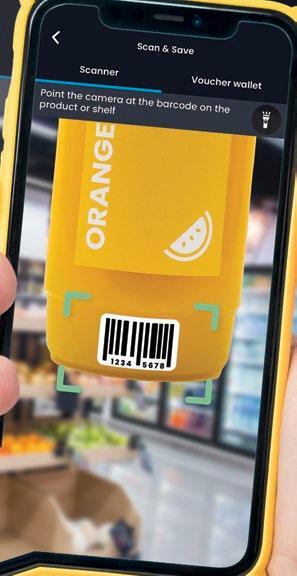



The leading loyalty and rewards platform for independent convenience stores

The one and only wholesaler specific loyalty rewards platform







Connecting digital social channels with physical products, anytime, anywhere









l t
Your Retail Experience
In the world of retail, every detail ma ers. A poor customer experience can tarnish your brand’s reputa on and impact profitabil .
Cegid’s unified commerce and retail opera ons platform can smooth out your omnichannel customer journeys, op mise stock availabil , and boost team e ciency.
1,000+ retailers across 75 countries trust Cegid to elevate their retail experience.




